2001: A Space Odyssey
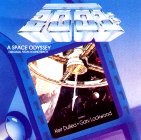 Somehow trying to call this compilation of existing classical numbers an “original soundtrack” is silly, but that’s what they called it. This is not the Alex North original score, but rather a collection of classical and somewhat-more-modern-than-classical music which Stanley Kubrick used in his famed definitive science fiction film. The Ligeti tracks are always unnerving even without the accompanying visuals of the mysterious monolith and the stargate, and the “Blue Danube” waltz is…well …overused, quite frankly. The highlight of this compilation for me is the excerpt from “Gayane” (which I’ve sometimes seen spelled “Gayeneh”), played over the bleakly solitary scenes of life aboard the spaceship Discovery. Whether it
Somehow trying to call this compilation of existing classical numbers an “original soundtrack” is silly, but that’s what they called it. This is not the Alex North original score, but rather a collection of classical and somewhat-more-modern-than-classical music which Stanley Kubrick used in his famed definitive science fiction film. The Ligeti tracks are always unnerving even without the accompanying visuals of the mysterious monolith and the stargate, and the “Blue Danube” waltz is…well …overused, quite frankly. The highlight of this compilation for me is the excerpt from “Gayane” (which I’ve sometimes seen spelled “Gayeneh”), played over the bleakly solitary scenes of life aboard the spaceship Discovery. Whether it  is the starkness of the music itself, or a kind of gestalt association of the music with the visuals, this music has always been incredibly powerful for me. A newer release of the 2001 soundtrack was recently issued, including a section of sound effects and HAL 9000 dialogue, but I have never “traded up” to the newer version, so I can’t vouch for its quality. But the music speaks for itself.
is the starkness of the music itself, or a kind of gestalt association of the music with the visuals, this music has always been incredibly powerful for me. A newer release of the 2001 soundtrack was recently issued, including a section of sound effects and HAL 9000 dialogue, but I have never “traded up” to the newer version, so I can’t vouch for its quality. But the music speaks for itself.
- Overture: excerpt from Atmospheres / Ligeti (2:47)
- Title Music: Also Sprach Zarathustra / R. Strauss (1:39)
- From Earth to the Moon: The Blue Danube / J. Strauss (9:49)
- TMA-1: Lux Aeterna / Ligeti (5:57)
- Discovery: Adagio from Gayane Ballet Suite / Kachaturian (5:13)
- Stargate: Requiem / Ligeti (5:58)
- Stargate II: Atmospheres / Ligeti (8:37)
- Transfiguration: Also Sprach Zarathustra / R. Strauss (1:39)
Released by: CBS
Release date: 1990
Total running time: 41:39
Ralf Illenberger – The Gateway
 The latest from Ralf Illenberger is a stunning change in pace from the serenity of Sedona, his previous entry. Though still experimenting with unusual harmonies, this album ramps up the intensity with a little more emphasis on rhythm and percussion, and even some electric guitar and keyboard touches. It’s easily his most exotic-sounding work since his solo debut on Narada ten years ago, and in my opinion, his best since 1993’s Soleil. Some of this material features the kind of complexity that most of us would expect to hear in a
The latest from Ralf Illenberger is a stunning change in pace from the serenity of Sedona, his previous entry. Though still experimenting with unusual harmonies, this album ramps up the intensity with a little more emphasis on rhythm and percussion, and even some electric guitar and keyboard touches. It’s easily his most exotic-sounding work since his solo debut on Narada ten years ago, and in my opinion, his best since 1993’s Soleil. Some of this material features the kind of complexity that most of us would expect to hear in a  movie score, as opposed to a more mainstream instrumental album, and in places it reminded me very much of Mike Oldfield’s very experimental Ommadawn. Highly recommended!
movie score, as opposed to a more mainstream instrumental album, and in places it reminded me very much of Mike Oldfield’s very experimental Ommadawn. Highly recommended!
- The Gateway (5:25)
- Cosmic Boogie (6:28)
- Wide Open (3:57)
- Blue Planet (5:15)
Caveland (7:24)
- Someone’s Coming (5:16)
- Electric Storm (5:40)
- The Winged Isis (7:42)
Released by: in joy music
Release date: 1998
Total running time: 47:48
Babylon 5: No Surrender, No Retreat
 I hadn’t actually planned on getting this CD, but two things happened – I spotted it at the local Best Buy at a very low price, and I saw the episode in question run on TNT. Since I was unable to tape a large slice of Babylon 5’s fourth season during its broadcast run, I didn’t remember the music particularly well (hence my panning of this particular soundtrack prior to its release), and so I hadn’t planned on getting this one. And naturally, therefore, it turned out to be one of the better Babylon 5 releases. The solid six minute cue covering the climactic battle between Sheridan’s rebel forces and Earth
I hadn’t actually planned on getting this CD, but two things happened – I spotted it at the local Best Buy at a very low price, and I saw the episode in question run on TNT. Since I was unable to tape a large slice of Babylon 5’s fourth season during its broadcast run, I didn’t remember the music particularly well (hence my panning of this particular soundtrack prior to its release), and so I hadn’t planned on getting this one. And naturally, therefore, it turned out to be one of the better Babylon 5 releases. The solid six minute cue covering the climactic battle between Sheridan’s rebel forces and Earth  loyalists is a thumping dose of musical ass-kicking, and though not quite as distinctive as other B5 themes such as the “Requiem For The Line, it’s a very good chunk of music. Another cue, “Londo And G’Kar In Trouble”, is repeated many times in later episodes of Babylon 5, and should be particularly familiar to fans, since it covered subdued and sorrowful moments for the remainder of the fourth season.
loyalists is a thumping dose of musical ass-kicking, and though not quite as distinctive as other B5 themes such as the “Requiem For The Line, it’s a very good chunk of music. Another cue, “Londo And G’Kar In Trouble”, is repeated many times in later episodes of Babylon 5, and should be particularly familiar to fans, since it covered subdued and sorrowful moments for the remainder of the fourth season.
- Enough Is Enough (1:21)
Earth Stands Alone (2:17)
Main title / fourth season (1:29)- Marcus En Route (0:46)
Vir’s Wake-Up Call (0:46)
Preparations For Battle (1:24)- Sheridan’s Plan (0:36)
Proxima III (0:49)
Start Ground Attack (0:27)
Londo & G’Kar In Trouble (2:50)
Departure of the Fleet (1:14)- Tensions Rising (4:43)
The Battle Begins (1:15)
Bester Unlocks Garibaldi (0:28)- No Surrender, No Retreat (5:59)
- Aftermath Moments (3:01)
Winners and Losers (0:58)
End Title (0:42)Released by: Sonic Images
Release date: 1998
Total running time: 30:33
The Grays – Ro Sham Bo
 Fronted by former Jellyfish guitarist Jason Falkner, The Grays were, not unlike Jellyfish, a short-lived experiment in excellent power-pop in the tradition of Rod Argent. The extremely melodic rock numbers on this album are all listenable, and the Falkner-penned “Very Best Years” leads off the album, a song that wouldn’t have been out of place on Falkner’s outstanding 1996 solo album. However, I find that my favorite songs on Ro Shambo were written by Jon Brion, another member of the group. I have no idea where this one went after the Grays, but his songwriting skills shine on “Nothing Between Us” and “Same
Fronted by former Jellyfish guitarist Jason Falkner, The Grays were, not unlike Jellyfish, a short-lived experiment in excellent power-pop in the tradition of Rod Argent. The extremely melodic rock numbers on this album are all listenable, and the Falkner-penned “Very Best Years” leads off the album, a song that wouldn’t have been out of place on Falkner’s outstanding 1996 solo album. However, I find that my favorite songs on Ro Shambo were written by Jon Brion, another member of the group. I have no idea where this one went after the Grays, but his songwriting skills shine on “Nothing Between Us” and “Same  Thing”, a fantastically harmonized tune both instrumentally and vocally. It’s really a shame that the Grays seem to have vanished even more quickly than Jellyfish did, because they truly had the spark of some prodigious talents, and this album remains unjustly in obscurity. Hard to find these days, but worth the search!
Thing”, a fantastically harmonized tune both instrumentally and vocally. It’s really a shame that the Grays seem to have vanished even more quickly than Jellyfish did, because they truly had the spark of some prodigious talents, and this album remains unjustly in obscurity. Hard to find these days, but worth the search!
- Very Best Years
- Everybody’s World
- Same Thing
- Friend Of Mine
- Is It Now Yet
- Oh Well Maybe
- Nothing Between Us
- Both Belong
- Nothing
- Not Long For This World
- Spooky
- All You Wanted
- No One Can Hurt Me
Released by: Elektra
Release date: 1994
Total running time: 59:06
Mulan – music by Jerry Goldsmith
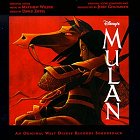 After some less-than-exceptional animation releases such as 1995’s Pocahontas (which I was turned off by the commercials alone) and 1996’s The Hunchback Of Notre Dame (which I found depressing), Disney managed to recover some of its lost magic with 1998’s hit Mulan. This movie is based upon an ancient Chinese poem about girl named Fa Mulan who, when her father is called into service to defend the China against the Huns, steals her father’s armor and goes into her father’s place by pretending to be a man, and ends up becoming a legend.
After some less-than-exceptional animation releases such as 1995’s Pocahontas (which I was turned off by the commercials alone) and 1996’s The Hunchback Of Notre Dame (which I found depressing), Disney managed to recover some of its lost magic with 1998’s hit Mulan. This movie is based upon an ancient Chinese poem about girl named Fa Mulan who, when her father is called into service to defend the China against the Huns, steals her father’s armor and goes into her father’s place by pretending to be a man, and ends up becoming a legend.
The music in this film is quite good. Jerry Goldsmith provides the score for most of the movie, while Matthew Wilder provides the music and David Zippel provides the lyrics for the (mercifully few) four songs that are played in the first part of the movie. (“True To Your Heart” and “Reflection” are, I believe, played during the end credits.) Both Matthew and Jerry make use of woodwind instruments, and give the music a somewhat Oriental feel while not alienating western audiences.
However, as much as I enjoyed the music and the movie, I found the CD lacking. One of the pieces of music when Mulan decides to join the army, prays to her ancestors, takes her father’s armor, cuts her hair, and rides off into the night was missing – yet it was one of the most dramatic pieces of music in the movie.
 The booklet included with the CD includes the lyrics to the songs, along with a photograph from the movie relating to each song.
The booklet included with the CD includes the lyrics to the songs, along with a photograph from the movie relating to each song.
In conclusion, if you enjoyed the movie, you might enjoy this CD, but expect some missing pieces.
- Honor to Us All (Song) (3:03)
- Reflection (Song) (2:27)
- I’ll Make a Man Out of You (Song) (3:21)
- A Girl Worth Fighting For (Song) (2:26)
- True To Your Heart (Single) (4:16)
- Suite from Mulan (7:06)
- Attack At The Wall (Score) (4:59)
- Mulan’s Decision (Score) (3:23)
- Blossoms (Score) (6:27)
- The Huns Attack (Score) (4:30)
- The Burned-Out Village (Score) (5:53)
- Reflection (Pop Version) (3:36)
Released by: Disney Music
Release date: 1998
Total running time: 51:34
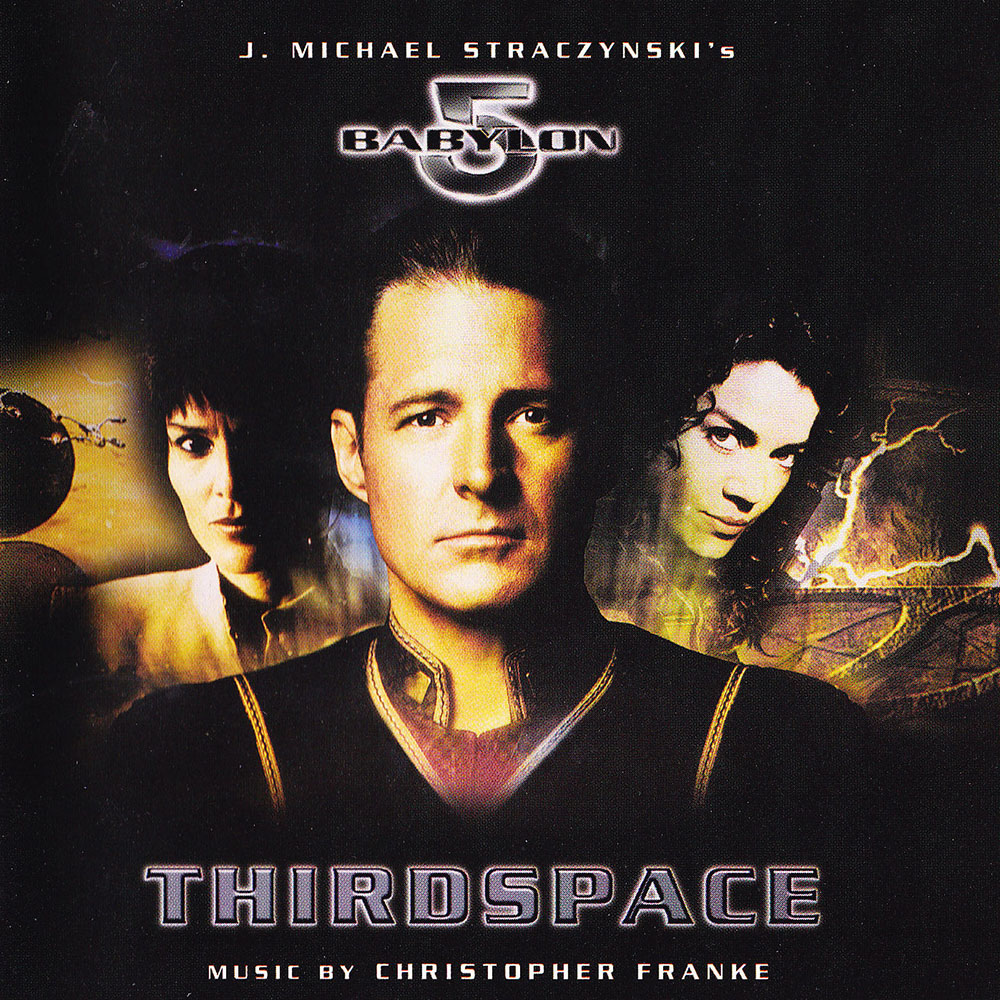
Babylon 5: Thirdspace
 In the second Babylon 5 movie made for TNT (though the first produced), a gigantic alien object of unknown origin is discovered, and the crew of B5 form an uneasy alliance with an unscrupulous Earth research company to investigate. The origins and purpose of the huge device turns out to be more horrific than anyone suspects. Thirdspace, as a story, was less than original, though tremendous production values and the usual sure-fire appeal of the Babylon 5 cast kept it from seeming totally derivative.
In the second Babylon 5 movie made for TNT (though the first produced), a gigantic alien object of unknown origin is discovered, and the crew of B5 form an uneasy alliance with an unscrupulous Earth research company to investigate. The origins and purpose of the huge device turns out to be more horrific than anyone suspects. Thirdspace, as a story, was less than original, though tremendous production values and the usual sure-fire appeal of the Babylon 5 cast kept it from seeming totally derivative.
If there was one aspect of Thirdspace I liked, it was a recurring theme for Lyta’s psychic connection with the artifact. Its strong resemblance to one of my favorite classical pieces – Holst’s “Neptune” – caught my attention on the first viewing (even if most of the movie’s storyline didn’t). There’s also another motif for the artifact, the unmistakable howl of the theremin, which works in some situations and becomes a clichè in others. This was an instance of the latter – Thirdspace‘s plot already seemed to be borrowed from countless sources, but the theremin-laden musical passages gave me flashbacks to black & white 1950s Universal horror flicks. The subliminal effect of a musical score can work against a production sometimes, and in this case, that vague pop-cultural association with cheesy horror movies stuck in my mind immediately. A somewhat more specific element borrowed from elsewhere shows up with a horn call in the “Bots Destroyed” cue – it sounds an awful lot like a motif from “The Dish” cue on the Star Trek: First Contact CD. In all fairness, I can’t honestly say that these things detracted from the show or made me think any less of it, but the similarities to other works did register on a subconscious level.
 Overall, however, I have to give Franke credit for creating a score which borrowed only minimally from his previous Babylon 5 music, a complaint I had with the otherwise outstanding soundtrack from In The Beginning, the first of the B5 movies to air on TNT. Even with the subliminal associations to other music and other movies, Thirdspace makes for an enjoyable soundtrack.
Overall, however, I have to give Franke credit for creating a score which borrowed only minimally from his previous Babylon 5 music, a complaint I had with the otherwise outstanding soundtrack from In The Beginning, the first of the B5 movies to air on TNT. Even with the subliminal associations to other music and other movies, Thirdspace makes for an enjoyable soundtrack.
- Act One (7:13)
- Battle To Survive (3:21)
- Back To the Station (0:40)
- Telepathic Mindflash (0:17)
- Vision Of A Shade (0:20)
- Hearing The Sound (0:33)
- The Bizarre Object (2:00)
- Act Two (9:00)
- The Monstrous Artifact Arrives (2:14)
- Truth Is Inconvenient (3:10)
- There Is Danger (1:51)
- We Have A Deal (1:13)
- Lyta’s Nightmare (1:14)
- Bots Take Off (1:19)
- Act Three (13:50)
- Bots Destroyed (0:50)
- You Have To Stop It (1:07)
- Lyta’s History (2:10)
- A Distant World (2:12)
- It Could Change Everything (1:11)
- The Black Tower (0:40)
- Ivanova’s Wild Dream (0:42)
- It’s Calling All Of Us (0:42)
- The Vision Of Thirdspace (2:34)
- We Have Contact (1:39)
- Act Four (11:51)
- Activated Artifact (1:02)
- Under Outside Control (1:34)
- Launch The Fighters (1:15)
- The Vorlon Legacy (6:45)
- Ivanova Arrests Dr. Trent (1:15)
- Act Five (15:09)
- Mobilization (0:44)
- Start The Attack (2:46)
- Vir’s Fight (1:38)
- Inside The Artifact (6:02)
- Sheridan Drifting In Space (0:56)
- One Mistake Out Of So Many (1:48)
- End Credits (1:15)
Released by: Sonic Images
Release date: 1999
Total running time: 59:22
Neil Finn – Try Whistling This
 This album’s big question is: can the former frontman of Crowded House, famous for such introspective ballads as “Don’t Dream It’s Over” and “Better Be Home Soon”, rock out on his own? Try Whistling This answers this with a resounding yes – and a few introspective ballads just to keep the diehard fans happy. The first single from the album, “Sinner”, is a gently jazzy ballad with some very cool vocals (Neil harmonizing with his own lead vocals), but my favorites on the album are “Faster Than Light”, a very Crowded House-ish acoustic guitar ballad, and the very unusual “Twisty Bass”, a rocking number with acoustic and electronic elements and a dark, driving sound which begs for a Nine Inch Nails-style video. The title track, “Try Whistling This”, was a much more subdued song than I expected given the challenge inherent in its title, and “Dream Date” has a very retro sound, reminiscent of some of the tracks on the Finn
This album’s big question is: can the former frontman of Crowded House, famous for such introspective ballads as “Don’t Dream It’s Over” and “Better Be Home Soon”, rock out on his own? Try Whistling This answers this with a resounding yes – and a few introspective ballads just to keep the diehard fans happy. The first single from the album, “Sinner”, is a gently jazzy ballad with some very cool vocals (Neil harmonizing with his own lead vocals), but my favorites on the album are “Faster Than Light”, a very Crowded House-ish acoustic guitar ballad, and the very unusual “Twisty Bass”, a rocking number with acoustic and electronic elements and a dark, driving sound which begs for a Nine Inch Nails-style video. The title track, “Try Whistling This”, was a much more subdued song than I expected given the challenge inherent in its title, and “Dream Date” has a very retro sound, reminiscent of some of the tracks on the Finn  Brothers album. If anything, the multifaceted Finn Brothers project seems to be the greatest influence on this album, rather than anything Crowded House or Split Enz have done in the past. While I have some concerns about whether or not Neil Finn will ever attain anything greater than a cult following as a solo artist, I truly enjoyed his first effort.
Brothers album. If anything, the multifaceted Finn Brothers project seems to be the greatest influence on this album, rather than anything Crowded House or Split Enz have done in the past. While I have some concerns about whether or not Neil Finn will ever attain anything greater than a cult following as a solo artist, I truly enjoyed his first effort.
- Last One Standing (3:04)
- Souvenir (3:41)
- King Tide (4:32)
- Try Whistling This (4:27)
- She Will Have Her Way (3:55)
- Sinner (4:25)
- Twisty Bass (5:09)
- Loose Tongue (4:12)
- Truth (4:03)
- Astro (3:45)
- Dream Date (4:51)
- Faster Than Light (4:22)
- Addicted (4:22)
Released by: Sony / Work
Release date: 1998
Total running time: 54:46
Babylon 5: Interludes and Examinations
 A pivotal hour in the B5 legend, this one features nothing less than the Shadow War engulfing the entire galaxy, the death of a major hero, and a painful return to the darkness for another major character. The music reflects this very well (especially the last cue, as the deceased’s remains are disposed of in space), though a lot of it reappears in slightly different form on the previously released Walkabout CD. Though there are some interesting and enjoyable stretches of music on this album, you may wish to consider carefully if you want to duplicate some music that is already
A pivotal hour in the B5 legend, this one features nothing less than the Shadow War engulfing the entire galaxy, the death of a major hero, and a painful return to the darkness for another major character. The music reflects this very well (especially the last cue, as the deceased’s remains are disposed of in space), though a lot of it reappears in slightly different form on the previously released Walkabout CD. Though there are some interesting and enjoyable stretches of music on this album, you may wish to consider carefully if you want to duplicate some music that is already  on Walkabout.
on Walkabout.
- Diary Entry (1:59)
Nothing Else Goes Wrong (0:31)
Main title (1:30)- We Cannot Defend Ourselves (0:28)
Crisis In Medlab (3:32)
Mr. Morden (0:22)Londo Meets With Morden (0:36)
Changing Plans (0:57)
Reports of Shadow Attacks (0:38)
In Need of a Victory (1:17)
Garibaldi & Hobbs (1:11)- Vir on a Shopping Spree (1:17)
Garibaldi Confronts Franklin (1:27)
Sheridan Confronts Kosh (3:48)- Vorlons Attack Shadows (1:47)
The Face of Death (5:06)- The Day After (0:36)
Londo Seeks Revenge (1:19)
Final Departure (1:27)
End Title (0:38)Released by: Sonic Images
Release date: 1998
Total running time: 22:45
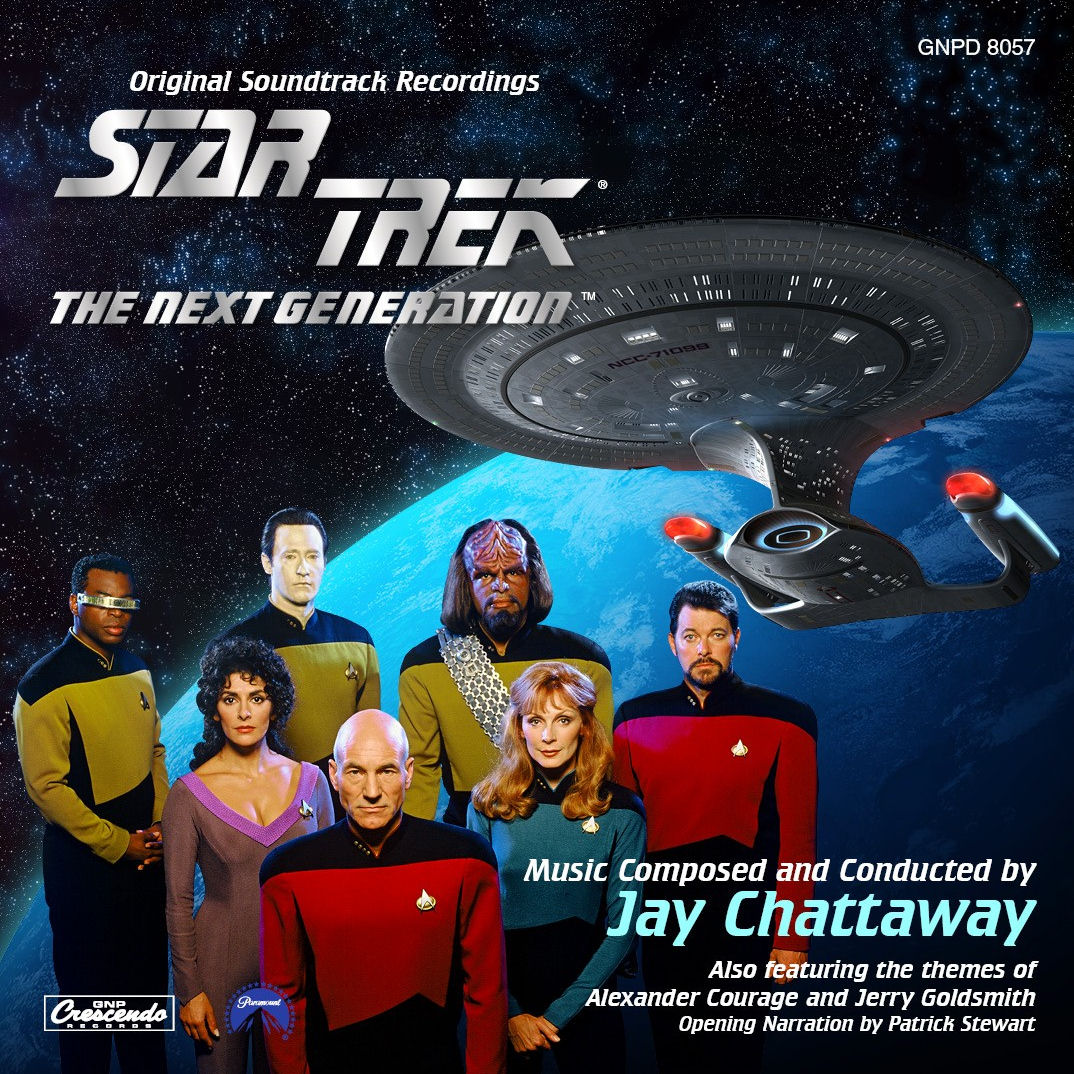
Star Trek: The Next Generation Volume 4
 Delayed for five years by disputes over royalties for the reuse of the union- recorded sessions, this long-overdue latest Trek soundtrack faces a unique problem in the area of sales – will anyone remember these soundtrack selections, which range anywhere from four to nine years old?
Delayed for five years by disputes over royalties for the reuse of the union- recorded sessions, this long-overdue latest Trek soundtrack faces a unique problem in the area of sales – will anyone remember these soundtrack selections, which range anywhere from four to nine years old?
The answer to that question is – well, yeah, I remember them. Though I have been highly critical of Jay Chattaway’s work on past occasions, he has actually done some very, very good work on the Star Trek series. One of his finest outings, the 1989 episode Tin Man, is represented by a fifteen-minute suite that kicks off this CD. Tin Man was Chattaway’s first Trek score, and in many ways still his best. Just as regular composers Dennis McCarthy and Ron Jones were being forced into a routinely less-than-exciting approach to writing music for the episodes, Chattaway put in a single third-season guest appearance with a rousing score in the best tradition of classic Trek, with some additional touches such as sampled whalesong and a throaty dijeridoo sound which were combined for the “organic” motif of the Tin Man creature.
Other standouts include yet another recording – though honestly I like this one much better – of the flute theme from the Hugo-winning Inner Light episode. As was the case with the orchestral version that appeared on the 1996 Best Of Star Trek CD, this is not the original recording, but it is much closer to the sound of the original, being a duet with Jay Chattaway on piano and his daughter Amy playing the much-loved theme on pennywhistle. A soaring five-minute cue from Birthright Part I – which accompanied Data’s dream-flight through his own subconscious – shows Chattaway to be the Trek composer who is probably the most adept at weaving electronics and synths into the show’s predominantly orchestral musical sound.
Other excerpts aren’t so stunning, to be quite honest. By the time of such episodes as Dark Page and Sub Rosa, thematic material was ousted from the musical language of Star Trek, leaving these cues with a very thick but melodically meandering sound. And, despite the fact that Chattaway has come up with some wonderfully melodic material in Tin Man and Inner Light, I must agree with fellow LogBook writer and Trek music fan Robert Heyman’s assessment – as far back as 1995 – that Chattaway tends to lean lazily upon a tired progression common to most of his work, regardless of which series he’s scoring. The climactic cue from A Fistful Of Datas, for example, survives only as an exercise in style. The fondly-remembered Spanish guitar and harmonica elements were fun in that episode’s music, but they quickly give way to a typical passage of trademark Chattaway Trek for the remainder of the track’s almost five-minute duration.
Also, in an area that not many reviews or reviewers concern themselves with, I have to give special mention to the very visible evolution of Crescendo’s packaging for the Star Trek CDs. There was a time, around 1991, when the inlay cards and booklets for the latest Trek soundtracks looked like they were fresh off of a bootlegger’s laser printer (though I grant you that neither Krupper nor Microgramma are easy fonts to reproduce, and neither are good choices for body copy). Even some of the pictures were dark and fuzzy, quite obviously snapshots from a videotape. Even though some of the photos in the booklet and the tray card of this CD are still video stills, their quality has improved dramatically. The biggest improvement has been with the quality of the printing itself – it’s legible! – something I have noticed since the Star Trek: Generations soundtrack. With this release and the 1996 release of the Star Trek: First Contact soundtrack, the Crescendo Star Trek soundtrack releases have ceased to  look like indie-label products languishing under a low budget, and have started to look much more like major releases on a major label. Not to downplay the labor of love that all of Crescendo’s Star Trek discs have been for the dedicated group of people who have stuck by them, but this one looks like it was somebody’s top priority – which certainly can’t hurt sales.
look like indie-label products languishing under a low budget, and have started to look much more like major releases on a major label. Not to downplay the labor of love that all of Crescendo’s Star Trek discs have been for the dedicated group of people who have stuck by them, but this one looks like it was somebody’s top priority – which certainly can’t hurt sales.
- Main Title – narration by Patrick Stewart (1:46)
Tin Man:
- Not Nice / Right / Scared (4:44)
- Closing / Tin Man Contact / Romulans (2:55)
- Meet (3:23)
- No Choice / Tam (3:56)
The Inner Light:
- Theme from The Inner Light (2:53)
Sub Rosa:
- Hooked On Ronin (3:59)
A Fistful Of Datas:
- A Fistful of Datas (4:54)
Dark Page:
- Painful Revelation (5:27)
Descent Part I:
- They’re Back! (2:54)
- Hook, Line and Sinker (3:19)
Descent Part II:
- Crusher To The Rescue (1:59)
Birthright Part I:
- Data In Dreamland (5:23)
- End Title
Released by: GNP Crescendo
Release date: 1998
Total running time: 48:26
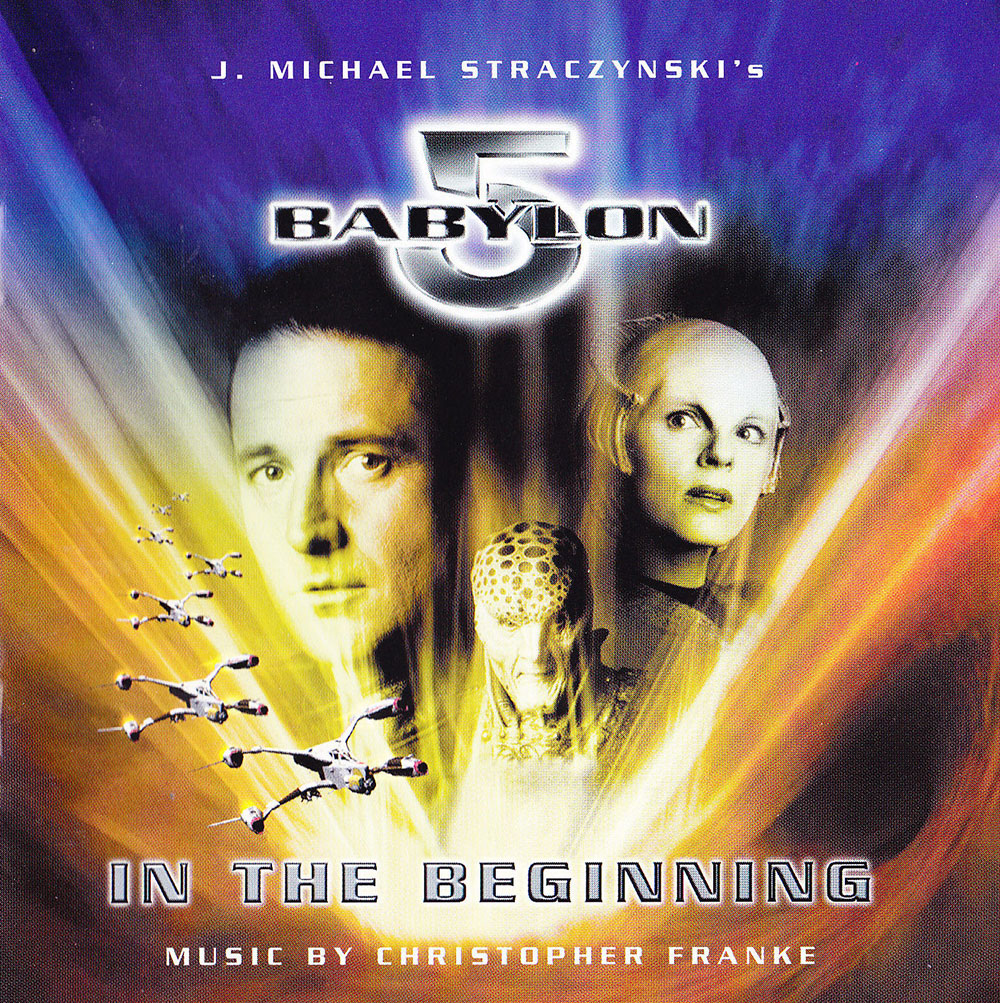
Babylon 5: In The Beginning
 The first of four Babylon 5 TV movies to air on cable channel TNT featured some very haunting and complex themes, as well as some very familiar ones for anyone who’s been listening to previous Babylon 5 soundtracks. After a brief introduction accompanying the opening monologue, the music turns somber with a very simple and slightly depressing motif accompanying Londo’s remembrances of events long past. Other interesting musical moments include Lenonn’s “abduction” by the Grey Council, the sobering “marching-toward-the-inevitable” tone of the music which underscored the scenes of the Earth cruisers approaching their disastrous date with destiny, and, of course, the dirge which opens the movie’s final act as Londo remembers the futility of the war. That cue, with its funereal atmosphere and a sound that falls somewhere between Mediterrenean and Scottish, could well be Christopher Franke’s best work since Babylon 5’s third season.
The first of four Babylon 5 TV movies to air on cable channel TNT featured some very haunting and complex themes, as well as some very familiar ones for anyone who’s been listening to previous Babylon 5 soundtracks. After a brief introduction accompanying the opening monologue, the music turns somber with a very simple and slightly depressing motif accompanying Londo’s remembrances of events long past. Other interesting musical moments include Lenonn’s “abduction” by the Grey Council, the sobering “marching-toward-the-inevitable” tone of the music which underscored the scenes of the Earth cruisers approaching their disastrous date with destiny, and, of course, the dirge which opens the movie’s final act as Londo remembers the futility of the war. That cue, with its funereal atmosphere and a sound that falls somewhere between Mediterrenean and Scottish, could well be Christopher Franke’s best work since Babylon 5’s third season.
However, Franke is slowly becoming the James Horner of series television scoring. Horner has been nailed countless times for recycling his own music in numerous movies – remember the Star Trek II and Star Trek III cues which found their way into Aliens? Even the amazingly popular Titanic soundtrack has been on the receiving end of accusations of unoriginality from sharp-eared listeners. Christopher Franke is fulfilling this role in the world of TV scoring these days, taking up his place alongside the small group of latter-day Star Trek TV composers in the annals of reuse of material. Granted, Franke scored Babylon 5 every week for five years, and so some bits, pieces and themes were bound to be heard more than once, along with a certain “house style” that could have the tendency to make many Babylon 5 scores sound the same. Still, he came up with so many wonderfully memorable and original pieces in the series’ second and third years, it’s hard to believe the amount of material that is recycled in the last two years of Babylon 5, to say nothing of In The Beginning. “The Requiem for the Line” was certain to reappear here, and it was rescored in a larger, more epic, more percussive style, which revitalized that particular piece we’ve been hearing since 1994. But numerous other cues were lifted wholesale from episodes of Babylon 5 which predate In The Beginning: Delenn’s induction into the Grey Council (a verbatim lift from Atonement) and the “Minbari Assembly/Troop Assembly” cue (rehashing a battle cue from Endgame) are just two examples.
Still, that’s a minor quibble; an Endgame CD has now been released, while Atonement no doubt waits in the wings for a future CD release, so not all of these pieces of music have been released on CD before. And it was nice to see the first Babylon 5 CD in over a year to sport a booklet with cover artwork! However, In The Beginning does share one flaw with the episodic soundtracks – numerous cues are bunched up into larger tracks, yet the music ends, there is a silence, and the next cue begins within the same track. How hard could it possibly be to divide the Babylon 5 CDs up more sanely? In The Beginning doesn’t attempt the same long, unified musical suites that distinguished  the two original Babylon 5 soundtracks (which predated the episodic CDs), so dividing the music up into tracks should present no problem. To this day, this quirk of the Babylon 5 soundtracks continues to mystify and irritate me. But the music, in the end, is what matters, and I can safely say that Babylon 5 fans will enjoy the music from In The Beginning.
the two original Babylon 5 soundtracks (which predated the episodic CDs), so dividing the music up into tracks should present no problem. To this day, this quirk of the Babylon 5 soundtracks continues to mystify and irritate me. But the music, in the end, is what matters, and I can safely say that Babylon 5 fans will enjoy the music from In The Beginning.
- Opening / It Began 35 Earth Years Ago / Meet The Grey Council / Londo’s
Terrible Truth (9:33)- Londo Remembers / Grey Council In Session / Decision To Go / Dukhat &
Kosh / Cargo Arrival / Prometheus On Course / Delenn Inducted / Earth Attack
(11:17)- Minbari Attack / Troop Assembly / I’ll See You Soon / Delenn In Her Quarters
/ Delenn Meets Kosh / The Human Allies (5:46)- Franklin in Medlab / Franklin Arrested / Minbari Attack / Sheridan’s Plan
(6:41)- Destroy the Black Star / Londo About Interception / Centauri Attack /
Captured and Released (8:04)- The War / The President’s Call / The Battle of the Line / Valen’s
Reincarnation / Our Last, Best Hope For Peace / The Story Is Never Over /
End Credits (15:42)Released by: Sonic Images
Release date: 1998
Total running time: 57:04
Ben Folds Five – Naked Baby Photos
 This is a nice item to have in the old collection, but the logic behind mass-marketing it – and barely a year behind Whatever And Ever Amen, which is just starting to catch the momentum from “Brick”‘s airplay – is beyond me. It’s more like a fan club premium than anything else. Naked Baby Photos consists entirely of live tracks, previously unreleased studio sessions, and even a few outtakes where the band was just goofing around. It’s a fun listen, but in the end may distract buyers
This is a nice item to have in the old collection, but the logic behind mass-marketing it – and barely a year behind Whatever And Ever Amen, which is just starting to catch the momentum from “Brick”‘s airplay – is beyond me. It’s more like a fan club premium than anything else. Naked Baby Photos consists entirely of live tracks, previously unreleased studio sessions, and even a few outtakes where the band was just goofing around. It’s a fun listen, but in the end may distract buyers  from the album which is bringing the band its bread and butter right now. The best actual songs are “Eddie Walker” and “Tom & Mary”, and the most fun on this CD can be found in the live sound-check-goof-off “For Those Of Y’All Who Wear Fannie Packs”, the band’s improvised ode to their roadies – it’s a rap parody that hits the mark almost too close!
from the album which is bringing the band its bread and butter right now. The best actual songs are “Eddie Walker” and “Tom & Mary”, and the most fun on this CD can be found in the live sound-check-goof-off “For Those Of Y’All Who Wear Fannie Packs”, the band’s improvised ode to their roadies – it’s a rap parody that hits the mark almost too close!
- Eddie Walker (3:20)
- Jackson Cannery – original 7" single (4:01)
- Emaline (3:24)
- Alice Childress – live on KCRW, Los Angeles, 10-16-95 (4:21)
- Dick Holster (0:29)
- Tom & Mary (2:36)
- For Those Of Y’all Who Wear Fannie Packs (6:06)
- Bad Idea – original demo version (2:08)
- Underground – live, Winston-Salem, 8-12-93 (4:43)
- The Ultimate Sacrifice – live, Providence, 5-28-97 (3:29)
- Satan Is My Master – live, Winston-Salem, 8-12-95 (1:33)
- Julianne – live, London, 11-26-96 (2:35)
- Song For The Dumped – live, London, 11-26-96 (4:42)
- Philosophy – live, Amsterdam, 3-18-97 (4:53)
- Twin Falls – live, Tokyo, 2-26-96 (2:25)
- Boxing – live, Tokyo, 2-26-96 (4:39)
Released by: Caroline
Release date: 1998
Total running time: 55:26
Babylon 5: Into The Fire
 Another pivotal chapter in the Babylon 5 saga, this explosive episode also featured quite a bit of memorable music, particularly long stretches of doomsday dirges that accompanied the battle of the aeon which took up most of the hour. As is often the case, the series’ most important installments were imbued with the best music, making this another good investment for Babylon 5 fans.
Another pivotal chapter in the Babylon 5 saga, this explosive episode also featured quite a bit of memorable music, particularly long stretches of doomsday dirges that accompanied the battle of the aeon which took up most of the hour. As is often the case, the series’ most important installments were imbued with the best music, making this another good investment for Babylon 5 fans.
However, as always, this recommendation comes with one major complaint attached. Many fans were struck silent by the episode’s final moments, in which the Babylon 5 theme song resolved atypically to a major key – a lovely, haunting musical moment. On this CD, that moment is destroyed because it is faded out quickly, as if Franke is saving that same piece of music so everyone will have to buy the inevitable Rising Star soundtrack (a later episode which ended on the same musical theme).
It’s bad enough that fans are being charged at least ten bucks a pop for no more than 30 or 35 minutes of music which arrives without a booklet, the most inexpensive part of CD manufacturing. It’s bad enough that  half a dozen discs are being turned out at once, aimed at the collectors’ market like a bunch of hideously overpriced trading cards. But when some of that very same music which is supposedly included in its original form fades out abruptly, I start to wonder if the fans are being done a great service by these CDs – or if they’re being taken for a ride.
half a dozen discs are being turned out at once, aimed at the collectors’ market like a bunch of hideously overpriced trading cards. But when some of that very same music which is supposedly included in its original form fades out abruptly, I start to wonder if the fans are being done a great service by these CDs – or if they’re being taken for a ride.
- A Human Strategy (3:15)
Main title / fourth season (1:29)- Two Cents For Chance (0:58)
Bad News For Morden (0:33)
An Undignified Position (0:24)
First Ones Philosophy (1:34)
Londo’s Temper (1:52)- The Weapon of Patience (1:09)
Blowing Up the Island (3:37)- A Wake-Up Call (2:28)
Calling In the First Ones (2:16)
Vorlons Spare Minbari (2:37)- The Cycle of History (6:33)
Beyond the Rim (3:33)- The Dawning of the Third Age (2:09)
End Title (0:42)Released by: Sonic Images
Release date: 1998
Total running time: 35:05
Electric Light Orchestra – Live At Wembley, 1978
 This has been available on videotape for ages, but in the past three or so years has seen release on CD and DVD as well. Does that really improve it? Well…no. Not really. Despite being a Royal Gala performance (with the Duke and Duchess of Gloucester in the crowd), this is far from the best live show ELO has ever put on. There are far stronger performances on the BBC Sessions disc and Live At Winterland. But this was from “the spaceship tour!” So naturally, this is what everyone remembers. (In case you’re one who doesn’t: the spaceship tour is the year-long globetrotting circuit ELO did using an enormous fiberglass spaceship set as its stage; the “flying saucer,” a weak likeness of the famous ELO spaceship on the Out Of The Blue album cover, would open each night with an elaborate fog and light show to reveal the band within – provided that the hydraulics to open the “lid” and lift the band up into view worked. Jeff Lynne has since likened the 1978 tour to Spinal Tap.)
This has been available on videotape for ages, but in the past three or so years has seen release on CD and DVD as well. Does that really improve it? Well…no. Not really. Despite being a Royal Gala performance (with the Duke and Duchess of Gloucester in the crowd), this is far from the best live show ELO has ever put on. There are far stronger performances on the BBC Sessions disc and Live At Winterland. But this was from “the spaceship tour!” So naturally, this is what everyone remembers. (In case you’re one who doesn’t: the spaceship tour is the year-long globetrotting circuit ELO did using an enormous fiberglass spaceship set as its stage; the “flying saucer,” a weak likeness of the famous ELO spaceship on the Out Of The Blue album cover, would open each night with an elaborate fog and light show to reveal the band within – provided that the hydraulics to open the “lid” and lift the band up into view worked. Jeff Lynne has since likened the 1978 tour to Spinal Tap.)
Things start out somewhat inauspiciously with the “Concerto For A Rainy Day / Standin’ In The Rain” intro…on tape. The rendition of the remainder of the song following the intro isn’t exactly the band’s high point.
The fact of the matter is that the sound on this album is atrocious. If you’re going to spring for the Live At Wembley album, get the DVD instead of the CD. That way, at least the awful sound quality is at least offset by the ability to see something. And sadly, this is probably the only concert footage of ELO we’re going to see until Lynne and his new recruits hit the road to crank out the classics and the new stuff  from Zoom this summer.
from Zoom this summer.
The DVD also features an entire separate section featuring the complete collection of laughably low-budget videos from the album Discovery, a nice bonus to help justify the cost.
- Introduction – Tony Curtis (2:48)
- Standin’ In The Rain (3:37)
- Night In The City (3:52)
- Turn To Stone (3:53)
- Tightrope (4:34)
- Telephone Line (4:19)
- Rockaria! (2:52)
- Wild West Hero (3:09)
- Showdown (3:13)
- 1-Minute Talk (0:54)
- Sweet Talkin’ Woman (3:53)
- Mr. Blue Sky (3:38)
- Do Ya (4:46)
- Livin’ Thing (3:57)
- Roll Over Beethoven (6:45)
Released by: Eagle / Edel
Release date: 1998
Total running time: 56:10
Babylon 5: The Ragged Edge
 The music for Babylon 5’s 100th episode, minus the visual component of the show, turns out to be largely unremarkable with only a couple of cues standing out. One accompanies the expansive computer-generated vista seen as Garibaldi steps out onto the balcony of his room on the Drazi homeworld, and the other is a fast-paced cue heard as Garibaldi finds himself fighting a band of murderous conspirators as well as a killer hangover.
The music for Babylon 5’s 100th episode, minus the visual component of the show, turns out to be largely unremarkable with only a couple of cues standing out. One accompanies the expansive computer-generated vista seen as Garibaldi steps out onto the balcony of his room on the Drazi homeworld, and the other is a fast-paced cue heard as Garibaldi finds himself fighting a band of murderous conspirators as well as a killer hangover.
Another unique feature of this particular episodic CD is the inclusion of the fifth season opening and closing themes. The motif which opens the theme was previously heard in a slice of original music on the Babylon 5: Messages From Earth CD which had not previously aired, and new elements were added to create the theme for Babylon 5’s fifth year. The second wave of Babylon 5 CDs all share one common element – unlike the first batch, none of them include the narration on the theme song. That’s welcome in this case, though the overlapping of voices and effects in the fifth season theme would’ve been interesting to hear in stereo – I’m sure I’m not the only  person whose cable system doesn’t offer much in the way of stereo signals.
person whose cable system doesn’t offer much in the way of stereo signals.
One very interesting element I picked up from listening to many of the seemingly quieter passages in headphones is a greater reliance on acoustic instruments – or perhaps they’re just better samples. Either way, it’s an interesting addition to the largely synthetic palette that Franke uses in his Babylon 5 scores.
- Get Ready for the Meeting (1:32)
Transport Attack (0:48)
Main Title / fifth season (1:31)- The Secret Around G’Kar (0:28)
Meeting in Sheridan’s Office (0:32)
Garibaldi’s Mission (0:45)
The Book of G’Kar (2:31)
- Garibaldi’s Departure (0:38)
Garibaldi Arrives at Drazi Homeworld (2:05)
Tafiq and Garibaldi Drunk (0:59)
Tafiq Gets Killed (0:27)
- Garibaldi In Trouble (3:32)
G’Kar Starts Teaching (0:44)
- Londo Recognizes Button (1:28)
G’Kar About Londo (1:16)
Franklin’s Decision (0:21)
- G’Kar Teaches (0:31)
Put Your Head In The Book (1:03)
Garibaldi Is Drunk Again (1:02)
End Title (0:36)
Released by: Sonic Images
Release date: 1998
Total running time: 22:42
Jewel – Spirit
 When I picked up Jewel’s sophomore effort, I worried that it was bound to be affected to some degree by the success of her previous album, but pleasantly, though it echoes the same signature sound, it isn’t Pieces Of You, Part II. In a very short time, Spirit has earned my respect with such memorable songs as “Deep Water”, “Down So Long” (the closest this album comes to the grittier sound of “Who Will Save Your Soul?”, which is actually the song that made me sit up and pay attention to Jewel), and the first single, “Hands”. If anything, Jewel’s lyrical skill has intensified on this album, but in a few places it seems as though the edge of the music composition has suffered. Some of the songs are very predictable in the
When I picked up Jewel’s sophomore effort, I worried that it was bound to be affected to some degree by the success of her previous album, but pleasantly, though it echoes the same signature sound, it isn’t Pieces Of You, Part II. In a very short time, Spirit has earned my respect with such memorable songs as “Deep Water”, “Down So Long” (the closest this album comes to the grittier sound of “Who Will Save Your Soul?”, which is actually the song that made me sit up and pay attention to Jewel), and the first single, “Hands”. If anything, Jewel’s lyrical skill has intensified on this album, but in a few places it seems as though the edge of the music composition has suffered. Some of the songs are very predictable in the  instrumental department, and end up being carried by the vocal alone, which seems like a slight letdown after some of the well-composed music on Jewel’s first album. Though this is still a solid collection, I think Jewel will need to concentrate more on the music for the next album, and may have to invent a slightly new sound to avoid creating a sonic signature that makes every album or song sound the same.
instrumental department, and end up being carried by the vocal alone, which seems like a slight letdown after some of the well-composed music on Jewel’s first album. Though this is still a solid collection, I think Jewel will need to concentrate more on the music for the next album, and may have to invent a slightly new sound to avoid creating a sonic signature that makes every album or song sound the same.
- Deep Water (4:16)
- What’s Simple Is True (3:34)
- Hands (3:54)
- Kiss The Flame (3:17)
- Down So Long (4:13)
- Innocence Maintained (4:08)
- Jupiter (4:18)
- Fat Boy (2:54)
- Enter From The East (4:02)
- Barcelona (3:53)
- Life Uncommon (4:56)
- Do You (4:21)
- Absence of Fear (3:43)
- This Little Bird (2:43)
Released by: Atlantic
Release date: 1998
Total running time: 53:56
Babylon 5: The Fall of Night
 Easily my favorite of the Babylon 5 episodic CDs to date, this is the soundtrack to the pivotal second season finale in which, as typically happens on Babylon 5’s season finales, the fictional stakes are raised beyond all belief. The crowning glory of this particular score is the cue which accompanies the unveiling of Ambassador Kosh, heralded with sampled choir, appropriate to Kosh’s appearance as an angelic being.
Easily my favorite of the Babylon 5 episodic CDs to date, this is the soundtrack to the pivotal second season finale in which, as typically happens on Babylon 5’s season finales, the fictional stakes are raised beyond all belief. The crowning glory of this particular score is the cue which accompanies the unveiling of Ambassador Kosh, heralded with sampled choir, appropriate to Kosh’s appearance as an angelic being.
The Fall Of Night is the first in Sonic Images’ second line of Babylon 5 episodic soundtracks, and opens up a couple of new problems with this series of CDs. More often than not, the first series of Babylon 5 episodic discs arrived without the customary liner notes booklets, forcing listeners to send e-mail to Sonic Images for free copies of the booklets. The six discs comprising the second lineup of episodic soundtracks eliminate that problem in a rather unsatisfactory way – by squishing the entire text of both pages of the booklet into a “ring” printed on the inside of the tray card, which can be read through the clear plastic of the  disc tray. Read, that is, if one has a microscope. Fortunately, the same liner notes are also available on Sonic Images’ web site, where they can be printed out much more legibly. My continuing gripes with Sonic Images’ packaging aside, the music alone makes The Fall Of Night the most worthwhile purchase of Babylon 5’s episodic soundtracks.
disc tray. Read, that is, if one has a microscope. Fortunately, the same liner notes are also available on Sonic Images’ web site, where they can be printed out much more legibly. My continuing gripes with Sonic Images’ packaging aside, the music alone makes The Fall Of Night the most worthwhile purchase of Babylon 5’s episodic soundtracks.
- Good Shooting (0:35)
Warning Signs (0:32)
Main Title (1:30)- Big Space Introduction (0:17)
Keffer On Bridge (0:35)
Keffer & Mitch (1:02)
Narn Ship Contact (0:33)- Silent Mysteries (0:29)
G’Kar On His Way (0:31)
The Nightwatch (1:24)
Mission Explained (0:55)- On Location (0:28)
History Unfolding (3:26)- Keffer Breaks Away (0:46)
Kosh Unveiled (5:17)Ivanova’s Closing Statement (2:18)
End Title (0:46)Released by: Sonic Images
Release date: 1998
Total running time: 22:45
Fear Of Pop – Volume One
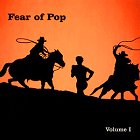 This side project from the Ben Folds Five frontman is billed as an “album of instrumental and spoken word music by Ben Folds” and Caleb Southern (the latter being the producer of the Ben Folds Five albums so far). And of course, its other main claim to fame is that it features the vocal stylings of one Mr. William Shatner on the song/rant “In Love”. The song in question consists of a standard modern-day synth-R&B backing vocal, while Shatner – as a frighteningly embittered rejected lover – proclaims his newfound disdain for the (former) object of his affections in a classic Shatner-esque performance. He doesn’t actually sing, so this is easily Shatner’s best musical appearance on record. Another attention-getter is the quasi-rap “I Paid My Money”, a song whose lyrics – “I see people leaving early, they don’t know what they’re missing, they don’t know what they’re missing, they’re missing half the movie!” – almost sound like an ode to everyone who paid full admission price just to see the trailer of a certain upcoming George Lucas opus. It’s also hilarious when Ben calmly announces “Funky bass!” in his unmistakable-for-anything-but-white voice. As an amusing diversion, Fear Of Pop fits the bill nicely, but it will probably come as a shock to those who are used to even the wildest Ben Folds Five tunes. Unlike those songs, Folds makes use of guitars,
This side project from the Ben Folds Five frontman is billed as an “album of instrumental and spoken word music by Ben Folds” and Caleb Southern (the latter being the producer of the Ben Folds Five albums so far). And of course, its other main claim to fame is that it features the vocal stylings of one Mr. William Shatner on the song/rant “In Love”. The song in question consists of a standard modern-day synth-R&B backing vocal, while Shatner – as a frighteningly embittered rejected lover – proclaims his newfound disdain for the (former) object of his affections in a classic Shatner-esque performance. He doesn’t actually sing, so this is easily Shatner’s best musical appearance on record. Another attention-getter is the quasi-rap “I Paid My Money”, a song whose lyrics – “I see people leaving early, they don’t know what they’re missing, they don’t know what they’re missing, they’re missing half the movie!” – almost sound like an ode to everyone who paid full admission price just to see the trailer of a certain upcoming George Lucas opus. It’s also hilarious when Ben calmly announces “Funky bass!” in his unmistakable-for-anything-but-white voice. As an amusing diversion, Fear Of Pop fits the bill nicely, but it will probably come as a shock to those who are used to even the wildest Ben Folds Five tunes. Unlike those songs, Folds makes use of guitars,  synths, samples, and just about everything you could think of as the antithesis of the Ben Folds Five sound. There’s something distinctly late-1980s about the feel of Fear Of Pop. If you’re expecting to get a laugh out of this, go ahead and pick it up. If, on the other hand, you’re expecting more Ben Folds Five smoothness, you might want to wait until this hits the cutout bin.
synths, samples, and just about everything you could think of as the antithesis of the Ben Folds Five sound. There’s something distinctly late-1980s about the feel of Fear Of Pop. If you’re expecting to get a laugh out of this, go ahead and pick it up. If, on the other hand, you’re expecting more Ben Folds Five smoothness, you might want to wait until this hits the cutout bin.
- Fear Of Pop (3:26)
- Kops (6:08)
- Slow Jam ’98 (4:50)
- Blink (1:24)
- In Love / guest vocals: William Shatner (4:46)
- Interlude (0:22)
- Avery M. Powers Memorial Beltway (5:59)
- I Paid My Money (3:16)
- Rubber Sled (4:56)
- Root To This (5:09)
- Still In Love (1:26)
Released by: Sony / 550
Release date: 1998
Total running time: 41:44
Babylon 5: The Face of the Enemy
 Yet another pivotal episode of Babylon 5, this tale of Sheridan’s betrayal by one of his own allies is remembered chiefly for the bizarre bit of custom-crafted rock music that accompanied that exact moment in the story. Unlike the Walkabout CD, Face Of The Enemy squeezes that song into one of the multi-cue tracks, as has come to be the norm for the Babylon 5 CDs, and furthermore, Sonic Images’ new practice of squeezing the liner and story notes into a ring of illegible text in the bottom of the clear CD tray leaves no room to credit the song’s performers – and they certainly deserve credit, for the song (ignominiously titled “Bar Background Music”) has much more depth than could readily be heard when the episode in question was broadcast. Two other cues, “Bester’s Whole Truth” and “Garibaldi
Yet another pivotal episode of Babylon 5, this tale of Sheridan’s betrayal by one of his own allies is remembered chiefly for the bizarre bit of custom-crafted rock music that accompanied that exact moment in the story. Unlike the Walkabout CD, Face Of The Enemy squeezes that song into one of the multi-cue tracks, as has come to be the norm for the Babylon 5 CDs, and furthermore, Sonic Images’ new practice of squeezing the liner and story notes into a ring of illegible text in the bottom of the clear CD tray leaves no room to credit the song’s performers – and they certainly deserve credit, for the song (ignominiously titled “Bar Background Music”) has much more depth than could readily be heard when the episode in question was broadcast. Two other cues, “Bester’s Whole Truth” and “Garibaldi  Comes To His Senses”, are also worthy of your time; the latter cue accompanied the bizarre montage of Garibaldi coming to the realization that he has spent nearly a year under Bester’s mind control. As is the case with most of the new Babylon 5 CDs, good music and lousy packaging.
Comes To His Senses”, are also worthy of your time; the latter cue accompanied the bizarre montage of Garibaldi coming to the realization that he has spent nearly a year under Bester’s mind control. As is the case with most of the new Babylon 5 CDs, good music and lousy packaging.
- The War Continues (1:35)
Thirty Pieces of Silver (0:28)
Main title / fourth season (1:29)- Meet The Agamemnon (2:55)
Telepath Cargo (0:49)
Garibaldi’s Message to Sheridan (1:00)- Ivanova Warns Sheridan (0:27)
Sheridan Departs for Earth (1:03)
Lyta’s History on Mars (2:28)
Bar Background Music (3:27)- Sheridan’s Arrest (1:11)
Edgar’s Whole Truth (4:16)
Bester Unlocks Garibaldi (0:28)- Garibaldi Downloaded (1:13)
Bester’s Whole Truth (4:45)
Garibaldi Coming To His Senses (0:48)- The Future Looming Ahead (3:23)
End Title (0:40)Released by: Sonic Images
Release date: 1998
Total running time: 32:20
The Move – Great Move!: The Best of the Move
 Though released nearly 25 years after the fact, this CD compilation contains the entirety of the Move’s final LP, Message From The Country, along with some B-sides and singles from the same era. Even before ELO was formed and subsequently split up, one can hear that Jeff Lynne and Roy Wood were moving in different musical directions on this album. Lynne’s dreamy “No Time” foreshadows some of the style he would bring to ELO after Wood’s departure, and Wood’s “It Wasn’t My Idea To Dance” focuses again on Wood’s obsession with 50’s rock ‘n’ roll which would become a trademark of his future solo and post-ELO output. This disc also has the Move version of “Do Ya”, which ELO later covered in 1976. There is one song I have to single out for special praise, in a strange way. There’s a reason why
Though released nearly 25 years after the fact, this CD compilation contains the entirety of the Move’s final LP, Message From The Country, along with some B-sides and singles from the same era. Even before ELO was formed and subsequently split up, one can hear that Jeff Lynne and Roy Wood were moving in different musical directions on this album. Lynne’s dreamy “No Time” foreshadows some of the style he would bring to ELO after Wood’s departure, and Wood’s “It Wasn’t My Idea To Dance” focuses again on Wood’s obsession with 50’s rock ‘n’ roll which would become a trademark of his future solo and post-ELO output. This disc also has the Move version of “Do Ya”, which ELO later covered in 1976. There is one song I have to single out for special praise, in a strange way. There’s a reason why  Move/ELO drummer Bev Bevan doesn’t sing a whole lot – though if ever there was a call for a deep basso voice in an ELO tune, I’m sure he made his contribution there. But on this album, Bev sang “Ben Crawley Steel Company”, a hysterically funny and decidedly non-politically- correct lament of a hard-up workman who’s losing it all. Take my work for it, it’s terribly amusing, if only for his singing!
Move/ELO drummer Bev Bevan doesn’t sing a whole lot – though if ever there was a call for a deep basso voice in an ELO tune, I’m sure he made his contribution there. But on this album, Bev sang “Ben Crawley Steel Company”, a hysterically funny and decidedly non-politically- correct lament of a hard-up workman who’s losing it all. Take my work for it, it’s terribly amusing, if only for his singing!
- Message from the Country (4:46)
- Ella James (3:12)
- No Time (3:39)
- Don’t Mess Me Up (3:11)
- Until Your Moma’s Gone (5:03)
- It Wasn’t My Idea To Dance (5:28)
- The Minister (4:27)
- Ben Crawley Steel Company (3:02)
- The Words of Aaron (5:25)
- My Marge (1:59)
- Tonight (3:17)
- Chinatown (3:06)
- Down On The Bay (4:13)
- California Man (3:35)
- Do Ya (4:02)
Released by: EMI
Release date: 1994
Total running time: 61:44
Schoolhouse Rock Rocks!
 This is a rockin’ selection of hysterically funny covers of the immortal tunes from those educational animated shorts that used to give ABC’s Saturday morning cartoons such a distinct identity. ABC tries to brand itself with an incredibly annoying series of banana-yellow graphics these days, but that will never even approach the popularity or instant recognition factor that ABC had with the Schoolhouse Rocks cartoons. Schoolhouse Rocks officially ascends to the status of cultural icon with this cover album, featuring a series of often faithful (and occasionally way-the-hell-out-there) covers performed by alt-rock and rap artists. The original Schoolhouse Rocks theme opens the proceedings, and Deluxx Folk Implosion promptly crashes the party with a very good copy of “I’m Just A Bill”, adding the modern touch of vocals dripping with thick, syrupy sarcasm. It’s hard to bang one’s head and laugh out loud at the same time, but this is a good song with which to try. Other standouts include a very good homage to “Electricity, Electricity” by all-girl band Goodness, and Ween’s very accurate rendition of “The Shot Heard ‘Round The World”. The more rap-oriented
This is a rockin’ selection of hysterically funny covers of the immortal tunes from those educational animated shorts that used to give ABC’s Saturday morning cartoons such a distinct identity. ABC tries to brand itself with an incredibly annoying series of banana-yellow graphics these days, but that will never even approach the popularity or instant recognition factor that ABC had with the Schoolhouse Rocks cartoons. Schoolhouse Rocks officially ascends to the status of cultural icon with this cover album, featuring a series of often faithful (and occasionally way-the-hell-out-there) covers performed by alt-rock and rap artists. The original Schoolhouse Rocks theme opens the proceedings, and Deluxx Folk Implosion promptly crashes the party with a very good copy of “I’m Just A Bill”, adding the modern touch of vocals dripping with thick, syrupy sarcasm. It’s hard to bang one’s head and laugh out loud at the same time, but this is a good song with which to try. Other standouts include a very good homage to “Electricity, Electricity” by all-girl band Goodness, and Ween’s very accurate rendition of “The Shot Heard ‘Round The World”. The more rap-oriented  covers, Biz Markie’s “Energy Blues” cover and Skee-Lo’s version of “The Tale of Mr. Morton”, weren’t really to my tastes, but I could actually see the wisdom of trying to introduce them to a new generation with a new idiom. And really, Biz Markie did pretty good with his tribute. I highly recommend this easy-to-find album for those in the mood for a nostalgic belly laugh!
covers, Biz Markie’s “Energy Blues” cover and Skee-Lo’s version of “The Tale of Mr. Morton”, weren’t really to my tastes, but I could actually see the wisdom of trying to introduce them to a new generation with a new idiom. And really, Biz Markie did pretty good with his tribute. I highly recommend this easy-to-find album for those in the mood for a nostalgic belly laugh!
- Schoolhouse Rocky – Bob Dorough and friends (0:14)
- I’m Just A Bill – Deluxx Folk Implosion (3:26)
- Three Is A Magic Number – Blind Melon (3:14)
- Conjunction Junction – Better Than Ezra (3:44)
- Electricity, Electricity – Goodness (3:22)
- No More Kings – Pavement (4:23)
- The Shot Heard ‘Round The World – Ween (3:09)
- My Hero, Zero – Lemonheads (3:05)
- The Energy Blues – Biz Markie (3:10)
- Little Twelvetoes – Chavez (3:51)
- Verb: That’s What’s Happening – Moby (4:29)
- Interplanet Janet – Man Or Astro-Man? (2:47)
- Lolly, Lolly, Lolly, Get Your Adverbs Here – Buffalo Tom (2:14)
- Unpack Your Adjectives – Daniel Johnston (3:06)
- The Tale of Mr. Morton – Skee-Lo (4:05)
Released by: Atlantic
Release date: 1996
Total running time: 48:29
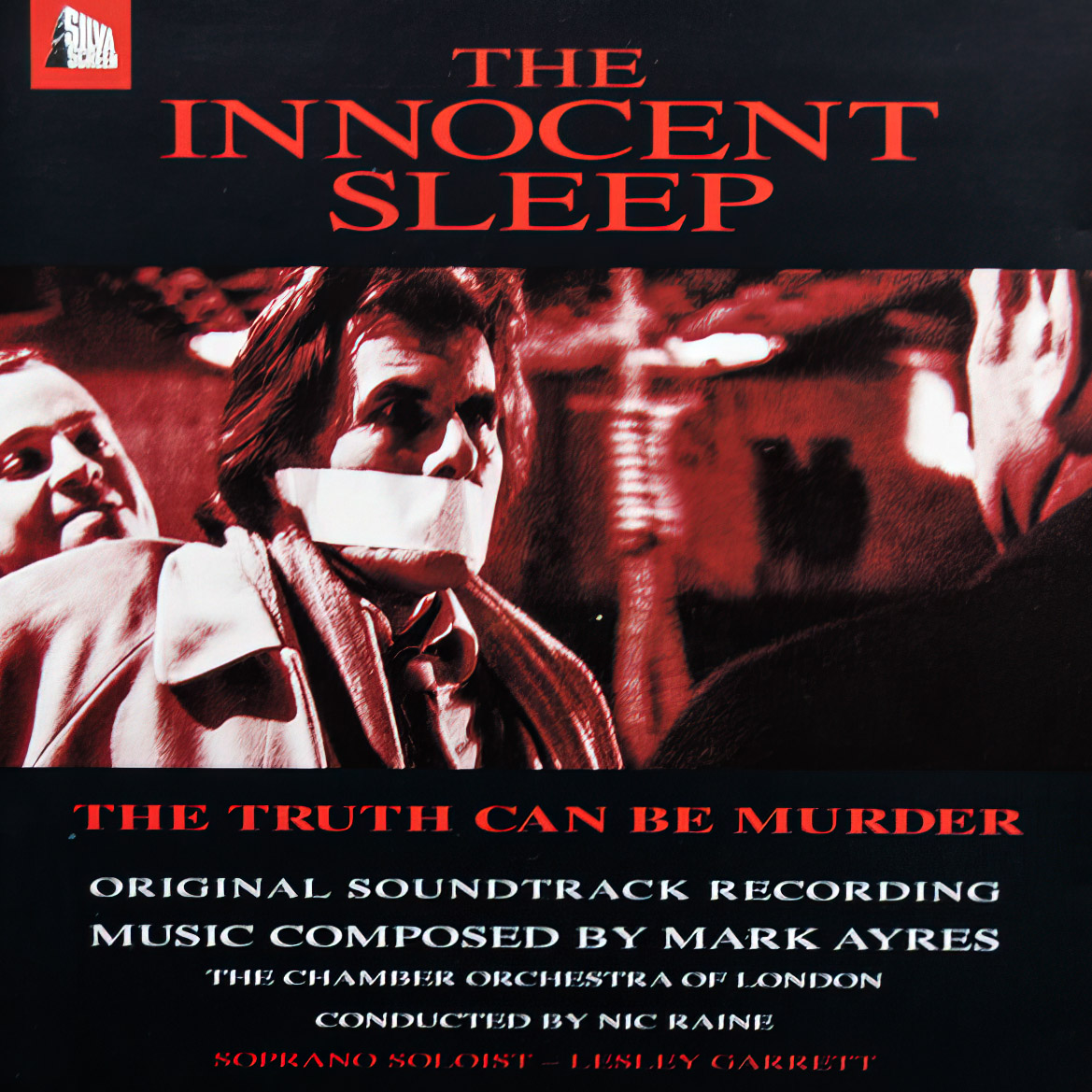
The Innocent Sleep – music by Mark Ayres
 So I wonder – with the sound of acoustic instruments being predominant on this soundtrack, is this Mark Ayres plugged in or unplugged? Perhaps a little of both. Either way, it’s a striking change from his past work, from the hauntingly wistful operatic motif of the main theme, to the pounding action scenes, all of them avoiding the many mistakes of recent film scores and establishing a very distinct character for the sound of the movie and Ayres’ own musical style. I’ve said it before, and perhaps now with a somewhat more mainstream film on his resumè, I can say it again more forcefully – Mark Ayres is definitely one to watch. Or listen to, at any rate. One seemingly minor thing I loved about this score is one particular motif which zig-zags around major and minor keys, never resolving to either one, a series of four chords
So I wonder – with the sound of acoustic instruments being predominant on this soundtrack, is this Mark Ayres plugged in or unplugged? Perhaps a little of both. Either way, it’s a striking change from his past work, from the hauntingly wistful operatic motif of the main theme, to the pounding action scenes, all of them avoiding the many mistakes of recent film scores and establishing a very distinct character for the sound of the movie and Ayres’ own musical style. I’ve said it before, and perhaps now with a somewhat more mainstream film on his resumè, I can say it again more forcefully – Mark Ayres is definitely one to watch. Or listen to, at any rate. One seemingly minor thing I loved about this score is one particular motif which zig-zags around major and minor keys, never resolving to either one, a series of four chords  which somehow manages to ascend and descend at the same time. It’s a beguiling little piece of music which appears in a number of cues, and it’s that kind of music, which manages to be intriguing both emotionally and structurally, that makes this an appealing album.
which somehow manages to ascend and descend at the same time. It’s a beguiling little piece of music which appears in a number of cues, and it’s that kind of music, which manages to be intriguing both emotionally and structurally, that makes this an appealing album.
- Il Sonno Innocente / The Innocent Sleep main title (2:49)
- The Old Site (1:27)
- Lusano / The Execution (4:56)
- Warehouse Chase (2:46)
- Riverside / Nightmare / Police Station (5:23)
- Jail Break (3:21)
- Billie / A Word With Willie (1:01)
- Cavani / Billie Meets Alan – Il Sonno Innocente (1:50)
- Alan Calls Home (3:12)
- Arson (2:40)
- Hospital / Alan at Billie’s Place (3:47)
- Press Conference (4:24)
- “Today In Focus” (1:26)
- Ears to the Ground / Motorbike Chase (2:42)
- Cavani Flies In (3:45)
- A Revelation and a Death (1:31)
- “Anybody But Stephens” / A Man for a Crisis (4:27)
- “Tutto Pusto” (4:49)
- Ashes – Il Sonno Innocente (2:21)
Released by: Silva Screen
Release date: 1995
Total running time: 59:04
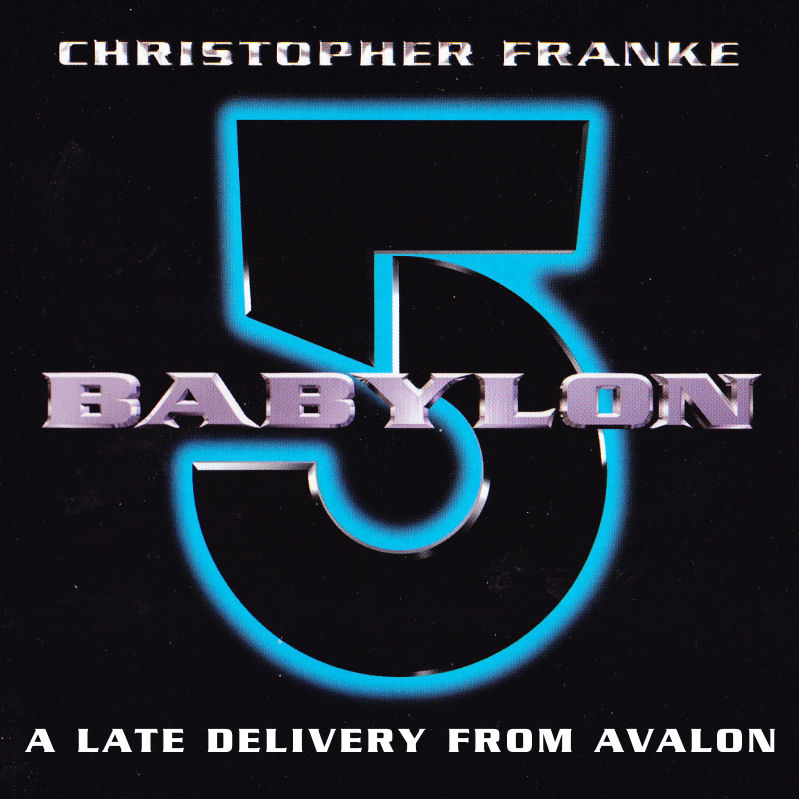
Babylon 5: A Late Delivery From Avalon
Well-loved for Michael York’s intense guest performance as a veteran of the Earth-Minbari War who thinks he’s a latter-day King Arthur, this installment of Babylon 5 received a kind of synth-Celtic treatment from Chris Franke at the request of J. Michael Straczynski, and that’s what it got. Though Celtic music has been attaining a widespread following for quite a while (some of which, sadly, is probably due to Riverdance and Lord Of The Pants), it could’ve gotten a better representation here. Now, in a way, that’s not an entirely fair assessment, because the music was not the focus of the episode, merely a background element. But in some places it comes across as very repetitive and not  terribly authentic in the Celtic department. Easily the best track on the album is the lengthy scene in which York’s character recalls his actual war experiences and the Arthurian parallels – and the music explodes into an epic-scale requiem.
terribly authentic in the Celtic department. Easily the best track on the album is the lengthy scene in which York’s character recalls his actual war experiences and the Arthurian parallels – and the music explodes into an epic-scale requiem.
- Setting the Stage (0:35)
Awakening (2:06)
Main Title / narration by Claudia Christian (1:29)- Franklin and Marcus (0:26)
Transition (0:30)
Arthur and Marcus part 1 (1:29)- Arthur and Marcus part 2 (1:13)
Arthur Gives In (0:38)
Franklin and Arthur (1:13)
Arthur Helps Old Lady (1:58)
Arthur Comes To Rescue (1:30)- G’Kar Helps Arthur (0:38)
"Sir" G’Kar (0:32)
Arthur’s Story Told (2:02)
G’Kar Drunk (0:44)
The Truth (1:18)- Arthur Becomes David (3:55)
The Lady of the Lake (1:44)
Arthur Departure (1:03)
Afterthoughts (0:47)
End Title (0:37)Released by: Sonic Images
Release date: 1997
Total running time: 26:37
Tori Amos – from the choirgirl hotel
 This one was a real surprise. Since her debut album in 1992, Tori’s music has always been imbued with at least a little bit of rage, from the victimization theme of Little Earthquakes, to the revenge theme of Under The Pink, and 1996’s who-really- knows-what-this-one’s-about Boys For Pèlè. She’s been accused of being everything from an angry feminist to a lesbian, and people either love her music or hate it. (Amusingly, I was once told in an IRC discussion that since I’m male, I have no right to listen to or enjoy Tori’s music because I didn’t agree with one chatter on what a particular song was about – proof that interpretation is everything in Tori’s music.) But this album is a total departure both musically and emotionally. Sure, there are still some ballads that have Tori’s ominously depressing signature (hey – some of us actually like that about her music!), but for the most part this album is a little bit more uplifting and not quite so emotionally distressed – why, in a few cases, it sounds like she’s having fun with it! Another change in Tori’s sound is the addition of a full band, consisting mainly of players who have graced her previous efforts. This time, the one-girl-and-her-piano sound – which some people considered to be Tori’s permanently carved niche in pop music – is pushed into the background in favor of rockier and more experimental combinations which made such previous songs as “Caught A Lite Sneeze” and “The Waitress” such standouts. Possibly my favorite song on the album thus far has been “Raspberry Swirl”, an oddity since I normally can’t stand the thumping-drum-‘n’-bass style, but her vocals make it interesting, especially that positively sultry, breathy “Let’s go” that opens the song. In some places, a little bit of vocal processing makes this sound like
This one was a real surprise. Since her debut album in 1992, Tori’s music has always been imbued with at least a little bit of rage, from the victimization theme of Little Earthquakes, to the revenge theme of Under The Pink, and 1996’s who-really- knows-what-this-one’s-about Boys For Pèlè. She’s been accused of being everything from an angry feminist to a lesbian, and people either love her music or hate it. (Amusingly, I was once told in an IRC discussion that since I’m male, I have no right to listen to or enjoy Tori’s music because I didn’t agree with one chatter on what a particular song was about – proof that interpretation is everything in Tori’s music.) But this album is a total departure both musically and emotionally. Sure, there are still some ballads that have Tori’s ominously depressing signature (hey – some of us actually like that about her music!), but for the most part this album is a little bit more uplifting and not quite so emotionally distressed – why, in a few cases, it sounds like she’s having fun with it! Another change in Tori’s sound is the addition of a full band, consisting mainly of players who have graced her previous efforts. This time, the one-girl-and-her-piano sound – which some people considered to be Tori’s permanently carved niche in pop music – is pushed into the background in favor of rockier and more experimental combinations which made such previous songs as “Caught A Lite Sneeze” and “The Waitress” such standouts. Possibly my favorite song on the album thus far has been “Raspberry Swirl”, an oddity since I normally can’t stand the thumping-drum-‘n’-bass style, but her vocals make it interesting, especially that positively sultry, breathy “Let’s go” that opens the song. In some places, a little bit of vocal processing makes this sound like a song that could just as easily have come from Siouxsie and the Banshees.
a song that could just as easily have come from Siouxsie and the Banshees.
The atypical burst of joy that fills most of Tori Amos’ latest entry makes it the best thing she’s done since Under The Pink, and is definitely worth some listening time.

- Spark (4:14)
- Cruel (4:07)
- Black Dove (January) (4:39)
- Raspberry Swirl (3:58)
- Jackie’s Strength (4:27)
- Iieee (4:08)
- Liquid Diamonds (6:21)
- She’s Your Cocaine (3:42)
- Northern Lad (4:20)
- Hotel (5:19)
- Playboy Mommy (4:09)
- Pandora’s Aquarium (4:46)
Released by: Atlantic
Release date: 1998
Total running time: 54:12
Schnell Fenster – The Sound Of Trees
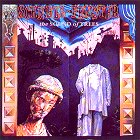 This little-known and distinctly 80’s entity consisted of Split Enz alumni Phil Judd, Noel Crombie, and Nigel Griggs (more or less the half of the band who didn’t go on to become regular members of Crowded House) along with Michael den Elzen, who later played guitar on at least one of ex-Enzer Tim Finn’s solo albums. At the same time that Crowded House was treading softer ground with Temple Of Low Men, these other former Enz members were trying to carve out a somewhat more quirky and dance-oriented niche for themselves, not unlike the territory Tim Finn had explored with his very pop-oriented early solo projects. But where Tim was upbeat, his former Enz cohorts were downright weird at times. Not that this is bad – at various times, Thomas Dolby and Howard Jones were also considered weird. Put simply, Schnell Fenster hauled the new-wave pop style out of the early 80’s, dragging it kicking and screaming (the style, not the band themselves) into the latter half of the decade, which was dominated by mechanical quasi-R&B dance grooves and rap. Sometimes, as with the catchy “Skin The Cat”, there’s even a hint of cool swing to the proceedings, and numerous other numbers play the new-wave game to the hilt, including “Whisper”, “Run-a-Mile” and “Never Stop”. I’ve found that there’s nothing on this album not to like,
This little-known and distinctly 80’s entity consisted of Split Enz alumni Phil Judd, Noel Crombie, and Nigel Griggs (more or less the half of the band who didn’t go on to become regular members of Crowded House) along with Michael den Elzen, who later played guitar on at least one of ex-Enzer Tim Finn’s solo albums. At the same time that Crowded House was treading softer ground with Temple Of Low Men, these other former Enz members were trying to carve out a somewhat more quirky and dance-oriented niche for themselves, not unlike the territory Tim Finn had explored with his very pop-oriented early solo projects. But where Tim was upbeat, his former Enz cohorts were downright weird at times. Not that this is bad – at various times, Thomas Dolby and Howard Jones were also considered weird. Put simply, Schnell Fenster hauled the new-wave pop style out of the early 80’s, dragging it kicking and screaming (the style, not the band themselves) into the latter half of the decade, which was dominated by mechanical quasi-R&B dance grooves and rap. Sometimes, as with the catchy “Skin The Cat”, there’s even a hint of cool swing to the proceedings, and numerous other numbers play the new-wave game to the hilt, including “Whisper”, “Run-a-Mile” and “Never Stop”. I’ve found that there’s nothing on this album not to like,  but if you have never heard of Schnell Fenster, it’s because this is an example of a band and an album out of time. It could’ve gone over huge only four or five years earlier, but its somewhat dated sound, along with Phil Judd’s penchant for whimsy which characterized his reign in the early days of Split Enz, kept it from gaining anything more than cult recognition among Enz fans.
but if you have never heard of Schnell Fenster, it’s because this is an example of a band and an album out of time. It could’ve gone over huge only four or five years earlier, but its somewhat dated sound, along with Phil Judd’s penchant for whimsy which characterized his reign in the early days of Split Enz, kept it from gaining anything more than cult recognition among Enz fans.
- Whisper (3:45)
- Love-Hate Relationship (3:59)
- Sleeping Mountain (3:44)
- That’s Impossible (3:26)
- This Illusion (3:42)
- Lamplight (3:35)
- The Sound of Trees (4:46)
- White Flag (3:36)
- Long Way Away (3:20)
- Skin the Cat (3:05)
- Run-a-Mile (3:02)
- Never Stop (4:12)
Released by: Atlantic
Release date: 1988
Total running time: 44:56
Tron – music by Wendy Carlos
 What a wild, weird and misunderstood musical score this is! Let’s set the record straight – this was a movie about video games. Not Mortal Kombat or Doom, but games from the era of Donkey Kong and Pac-Man. The era where an Ensoniq sound chip capable of polyphony was quite a major coup for a quarter-grabbing arcade machine. The music is supposed to be electronic-sounding! And it’s not as if traditional instrumentation was nowhere to be found – there are numerous helpings of orchestra and, in some of the more inspired moments of the score, some choral textures bring out an element of the story which was buried by special effects and the script. Some of the least-recognized moments of this score are the most mesmerizing when heard away from the vision of Bruce Boxleitner and Jeff Bridges cavorting around in fluorescent tights. “Water Music and Tronaction” benefits from a truly haunting arrangement – when I dug out my battered LP about a year ago and listened, I was hooked all over again, and the Tron motif is used most effectively here outside of the main theme. The “Magic Landings” cue is a gem because the best parts of it – cartoonish action music for Jeff Bridges’ clumsy handling of a robotic vehicle – were mixed out of the movie altogether! “Tower Music” is perhaps the most noteworthy track due to its brilliant subtlety and use of choir to underscore the religious nature of the scene. The end credit music is also
What a wild, weird and misunderstood musical score this is! Let’s set the record straight – this was a movie about video games. Not Mortal Kombat or Doom, but games from the era of Donkey Kong and Pac-Man. The era where an Ensoniq sound chip capable of polyphony was quite a major coup for a quarter-grabbing arcade machine. The music is supposed to be electronic-sounding! And it’s not as if traditional instrumentation was nowhere to be found – there are numerous helpings of orchestra and, in some of the more inspired moments of the score, some choral textures bring out an element of the story which was buried by special effects and the script. Some of the least-recognized moments of this score are the most mesmerizing when heard away from the vision of Bruce Boxleitner and Jeff Bridges cavorting around in fluorescent tights. “Water Music and Tronaction” benefits from a truly haunting arrangement – when I dug out my battered LP about a year ago and listened, I was hooked all over again, and the Tron motif is used most effectively here outside of the main theme. The “Magic Landings” cue is a gem because the best parts of it – cartoonish action music for Jeff Bridges’ clumsy handling of a robotic vehicle – were mixed out of the movie altogether! “Tower Music” is perhaps the most noteworthy track due to its brilliant subtlety and use of choir to underscore the religious nature of the scene. The end credit music is also  worth a listen, particularly the last half – again omitted from the movie’s sound mix in favor of a Journey song – which neatly ties together the various catchy themes and climaxes in a rousing flourish which was previously only heard when you finished playing the Tron arcade game. Very worthwhile listening, and surprising for its experimental nature.
worth a listen, particularly the last half – again omitted from the movie’s sound mix in favor of a Journey song – which neatly ties together the various catchy themes and climaxes in a rousing flourish which was previously only heard when you finished playing the Tron arcade game. Very worthwhile listening, and surprising for its experimental nature.
- Creation of Tron (0:45)
- We’ve Got Company (2:15)
- Wormhole (2:25)
- Ring Game and Escape (2:53)
- Water Music and Tronaction (2:36)
- Miracle and Magician (2:36)
- Magic Landings (3:40)
- Theme from Tron (1:30)
- Love Theme (2:05)
- Tower Music – Let Us Pray (3:43)
- The Light Sailer (2:32)
- Sea of Simulation (3:20)
- A New Tron and the MCP (5:45)
- Anthem (1:36)
- Ending Titles (5:10)
Released by: Disney
Release date: 1982 (this score was later re-released in 2002)
Total running time: 42:17
Ren & Stimpy – Radio Daze
 And here we have an example of what made You Eediot! so great. You Eediot! was great because it wasn’t Radio Daze. This decidedly more childlike release – in keeping with its namesake TV series around that time – follows a moronic premise which is frequently stretched molecule-thin. Ren and Stimpy take on a radio career which, in the space of a half hour, skyrockets to Hollywood fame and then back into the dregs, along with this album. Radio Daze is emblematic of what happened to the entire Ren & Stimpy franchise after Nickelodeon evicted creator John Kricfalusi from his own property – they ceased to mine the rich vein of not-even-remotely-for-
And here we have an example of what made You Eediot! so great. You Eediot! was great because it wasn’t Radio Daze. This decidedly more childlike release – in keeping with its namesake TV series around that time – follows a moronic premise which is frequently stretched molecule-thin. Ren and Stimpy take on a radio career which, in the space of a half hour, skyrockets to Hollywood fame and then back into the dregs, along with this album. Radio Daze is emblematic of what happened to the entire Ren & Stimpy franchise after Nickelodeon evicted creator John Kricfalusi from his own property – they ceased to mine the rich vein of not-even-remotely-for- kids cartoon comedy that he had exposed, and instead went digging for the lowest available denominator. In Nickelodeon’s hands, Ren & Stimpy buried itself quickly. This has been the last Ren & Stimpy CD to date.
kids cartoon comedy that he had exposed, and instead went digging for the lowest available denominator. In Nickelodeon’s hands, Ren & Stimpy buried itself quickly. This has been the last Ren & Stimpy CD to date.
- Opening (1:27)
- I Wanna Be A DJ (3:41)
- Caller #5 (4:02)
- King of the Airwaves (3:27)
- Is Anyone Out There (3:02)
- On The Road (3:49)
- Any Freeway You Take (3:20)
- Hard Time (3:49)
- Powdered Toast Man (3:29)
- In Hollywood (3:10)
- Take A Walk on the Muddy Side (3:32)
- Dead-End Job (1:29)
- Stuck With You (3:18)
Released by: Sony Wonder
Release date: 1995
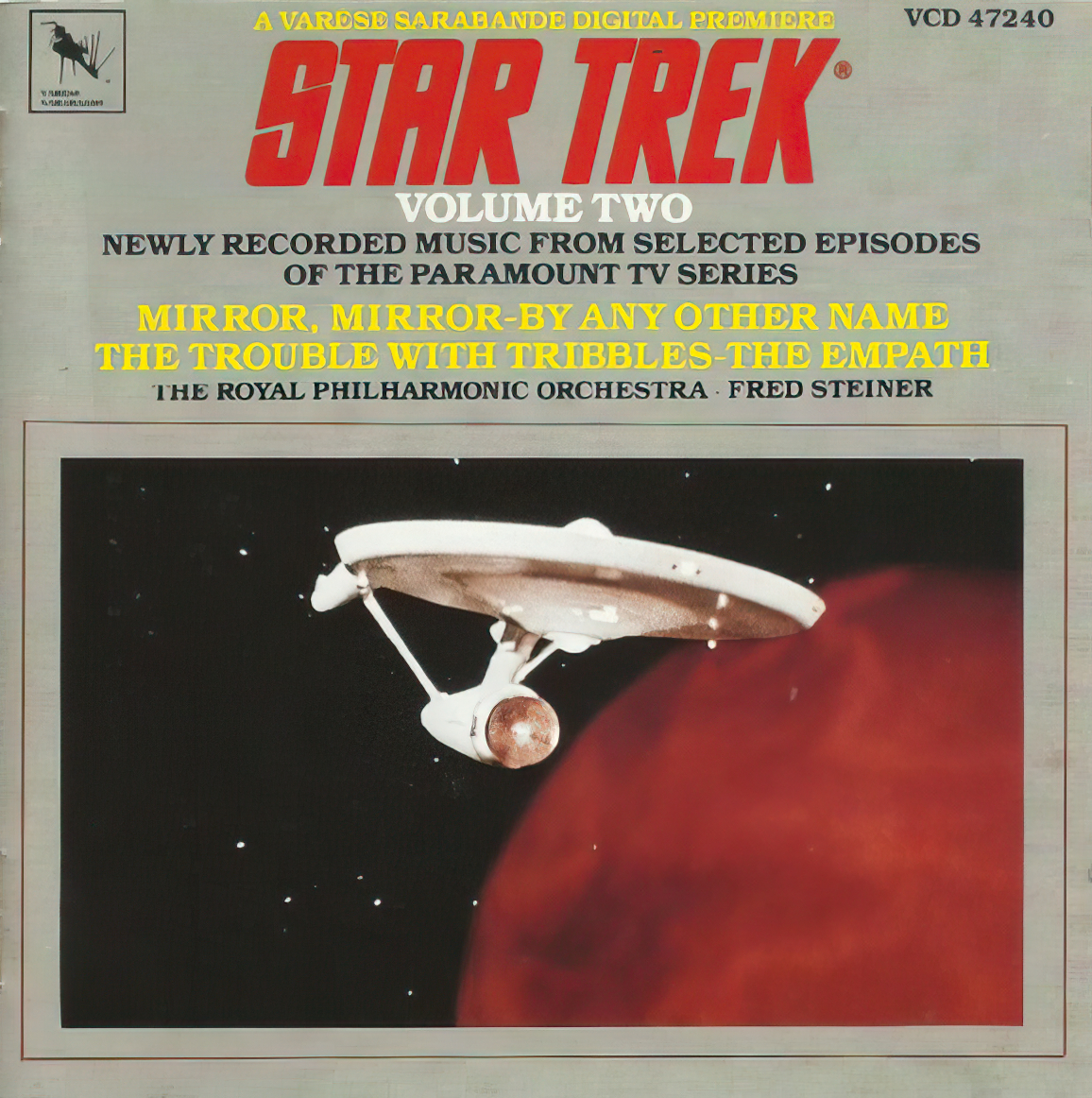
Star Trek: Newly Recorded Music, Volume 2
 It took me years to find this second volume, and though after a while a lot of Classic Trek music starts to sound the same, the music from Mirror, Mirror was an eye-opener for me – I had never realized how frequently the “Black Ship Theme” (for the evil Enterprise) was used from then on in the series, nor where it had originated. Now I know. The cues from Mirror, Mirror and The Empath alone make this a worthwhile purchase for any Trek musicologists out there, and again the
It took me years to find this second volume, and though after a while a lot of Classic Trek music starts to sound the same, the music from Mirror, Mirror was an eye-opener for me – I had never realized how frequently the “Black Ship Theme” (for the evil Enterprise) was used from then on in the series, nor where it had originated. Now I know. The cues from Mirror, Mirror and The Empath alone make this a worthwhile purchase for any Trek musicologists out there, and again the  sound quality – since it’s a digital re-recording – is exceptional.
sound quality – since it’s a digital re-recording – is exceptional.
- Star Trek main title & closing theme (1:19)
Suite from By Any Other Name
- Neutralizer, Kelvan theme, More Neutralizer, Broken (3:42)
- Rojan’s Revenge, Rojan’s Blocks, Pretty Words, Victory (5:32)
Suite from The Trouble With Tribbles
- A Matter of Pride, No Tribble At All, Big Fight (4:19)
Suite from Mirror, Mirror
- Mirror Mirror, Black Ship Theme, Agonizer, Meet Marlena (4:38)
- Black Ship Tension, Goodbye Marlena, Short Curtain (3:51)
Suite from The Empath
- Enter Gem, Kirk Healed (2:07)
- Vian Lab, The Subjects, Cave Exit, Star Trek Chase (3:37)
- Help Him, Spock Stuck, McCoy Tortured (5:17)
- Time Grows Short (5:06)
- Vian’s Farewell, Empath Finale (2:20)
Released by: Varese Sarabande
Release date: 1986
Total running time: 41:57
Fastball – All The Pain Money Can Buy
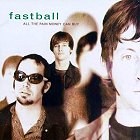 I admit, thanks largely to VH-1, that I finally found the very Beatlesque single The Way too interesting (and well-written) to resist the album (especially since the album was on sale). And the verdict…? Honestly, even for eight bucks, I was a bit disappointed. If anything, this album reminds me a lot of Deadeye Dick’s A Different Story album – as was the case with “New Age Girl”, it seems like most of the album’s creative effort was poured into “The Way”, and the rest of the album isn’t as interesting. Hopefully
I admit, thanks largely to VH-1, that I finally found the very Beatlesque single The Way too interesting (and well-written) to resist the album (especially since the album was on sale). And the verdict…? Honestly, even for eight bucks, I was a bit disappointed. If anything, this album reminds me a lot of Deadeye Dick’s A Different Story album – as was the case with “New Age Girl”, it seems like most of the album’s creative effort was poured into “The Way”, and the rest of the album isn’t as interesting. Hopefully  you too will find this on sale, for it’s scarcely worth the already-inflated average full purchase price of a compact disc.
you too will find this on sale, for it’s scarcely worth the already-inflated average full purchase price of a compact disc.
- The Way (4:16)
- Fire Escape (3:21)
- Better Than It Was (2:48)
- Which Way To The Top? (3:50)
Sooner Or Later (2:39)
- Warm Fuzzy Feeling (1:55)
- Slow Drag (3:37)
- G.O.D. (Good Old Days) (3:31)
- Charlie, The Methadone Man (3:17)
- Out Of My Head (2:32)
- Damaged Goods (3:02)
- Nowhere Road (3:25)
- Sweetwater, Texas (3:53)
Released by: Hollywood Records
Release date: 1998
Total running time: 42:10
XTC – Skylarking
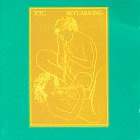 I bought this album when it first came out and was immediately entranced. I lost it a few years ago, and only managed to find it again today. It’s not that difficult to find, but I have very limited time for that sort of thing. The reason I wanted it back was that after all the time without the disk to listen to, I still found myself singing bits of the album to myself.
I bought this album when it first came out and was immediately entranced. I lost it a few years ago, and only managed to find it again today. It’s not that difficult to find, but I have very limited time for that sort of thing. The reason I wanted it back was that after all the time without the disk to listen to, I still found myself singing bits of the album to myself.
This is not an album for everyone, by any stretch. A severe diversion from earlier XTC, this album contains none of the punk/new wave with which the band first made their mark, and yet it’s unmistakably an XTC album. When I listen to this album, I have always thought that this is the type of music John Lennon would have produced had he survived. There are some extremely Beatles-esque sections, but the themes are very mature. There are also some very somber (if not experimental) sections which I could see Lennon exploring.
I couldn’t critique this album without mentioning Todd Rundgren. Whoever conceived of bringing Todd in to produce an XTC album deserves a pat on the back. It’s unusual to see a producer of that magnitude brought in when the band includes someone with the creative talents of Andy Partridge. Todd is so influential that it’s almost unheard of for his tastes to not show in one of his productions (e.g. the Bourgeois Tagg album which was released at about the same time as this one). I had forgotten that Todd produced this album until I read the liner notes a few minutes ago. It’s also interesting to note that the liner notes give Todd credit for the “continuity concept”. Given that this is very nearly a concept album, I have to wonder how much input Todd had in the final product. I would think if he was instrumental (pun intended) in the underlying concept, we’d hear more of his influence. Since we don’t, I’m a bit puzzled by that idea. Still, it’s a stunning album, so on with the show.
The album opens like the first Klaatu album, and sounds almost as whimsical. “Summer’s Cauldron” draws a picture of “Summertime and the living is easy”, but there’s a surreal undertone underlying the entire piece. He tells us “Please don’t pull me out, I’m relaxed in the undertow”. On the surface it’s all peace and love – “Miss Moon lays down and Sir Sun stands up” – and that’s definitely the scene of the song. Still, Andy is singing about a situation that, while pastoral in the extreme, he knows he’s (forgive the pun) in over his head when he adds “Me, I’m found floating round and round like a bug in brandy”. This song also introduces the concept which guides the album: the seasonal procession. We begin in high Summer, and we’ll end in late Fall.
“Grass” marks the happiest point on the album, and is really more an extension of the first song rather than a piece unto itself. This song increases the East Indian flair of the first song, but it’s still a subtle effect. This is a very happy, simple song about making out while high. It completes the first section of the album.
Our couple has had the early “magical” portion of their relationship in “The Meeting Place,” and now they’re maturing. She’s working now, and her life is more regulated. She’s taken up smoking. Still, they can sneak out for a tryst on her lunch hour at the meeting place, but they have so much passion for each other that she’ll be “late back again”.
But in “That’s Really Super, Supergirl,” as her career grows, she’s forced to make endless choices between job and boyfriend. Guess who loses? It’s not him that’s claiming she’s super – it’s her co-workers. In the end, he’s swept “like dirt underneath your cape”. He “might be an ape, but I used to feel super”. Not anymore.
In “Ballet For A Rainy Day,” we get a picture of how he spends his days these days. He’s painting. He’s trying to be true to his youthful ideals. But no matter how he tries, he feels trapped in a rainy day. She’s climbing the ladder, while he sees no progress.
And the inevitable happens. “1000 umbrellas couldn’t catch all the rain that drained out of my head when you said we were over.” In typical response, he can’t see what she’s saying, and has to interpret it in context with his current situation – “and just when I thought that my vista was golden in hue.” He wallows through misery, but vows to pick up and carry on.
And he does. He works at his painting and he works at her. Seasons pass, and he keeps trying to win her back. As she grows in her business career, he grows in his calling as a painter. He makes her think about life outside her cubicle. He makes her think about having a family. He even makes her think about God (“Who’s pushing the pedals on the Season Cycle?”) Finally when Spring comes around and life is waking up all around her (“It’s growing green”), she takes him back.
Now, in “Earn Enough For Us,” it’s his turn. He wants to provide for her. He’s taken a job, and he wants to be the breadwinner. He wants to buy a house and settle down in the whole DIY thing. He must have done a good job, because she wants to get married. Before long he finds out why she wants to get married – she’s pregnant. He tells her he’ll get a second job to help pay for the baby, but he’s not sure he wants to get married.
But the “Big Day” comes. It “could be heaven; could be hell in a cell for two”. Either way, he’s committed. They do the deed, despite all the advice to the contrary.
But our hero gets his big break all of a sudden. His painting is recognized, and suddenly his creative juices are in demand. He begins working at a feverish pace. He’s in his studio constantly. He finds he simply doesn’t have the time to spend with the wife he worked so hard to earn. More than that, he finds her a nuisance. Any time that she wants to spend with him takes away from time he could be using to create a new painting. In short, he doesn’t “need another satellite”. And of course, that sentiment encompasses his child as well. More time passes and they remain “Circling we’ll orbit another year, two worlds that won’t collide.” Now instead of lying beside him, Miss Moon “still tries to steal the tide away”.
“The Man Who Sailed Around His Soul” is the quirkiest song on the album. While most of the songs have the aforementioned Beatles feel about them, this one is fashioned after a 60’s style jazz combo – something I’ve always found to be very inaccessible. Still, I probably relate more to this song than any other on the album. The entire sentiment is captured in the first lines, “The man who sailed around his soul, from East to West, from pole to pole, with Ego as his drunken captain, Greed, the mutineer, had trapped all reason in the hold.” He gives himself over to his career, forgetting the lesson his wife taught him along with everything else. The magic is gone, the dream is over. Eventually he realizes what he’s sacrificed, but it’s far too late.
“Dear God” is the focal point of the entire album. We’ve come a long way from the carefree images of the early songs. This song is a duet sung by a father and child who are nowhere near each other. Both see the cruelty of the world, and both reach the same conclusion. But they do it apart from each other. Perhaps the sins of the father are paid by the son. They sing of the problems of the world, and how they can’t believe that a benevolent god would allow them to happen. The irony is in the title itself. To whom are they singing? As with the vast majority of us – even those claiming to be atheists – when push comes to shove, if you were brought up with a Judeo-Christian training, you fall back on the concept of God when all else fails. The child is calling on God because that’s where you go when you really need help. The father is turning back to God after years of neglect, simply because he has no other place to turn. He never managed to replace that belief system that was ingrained in him as a child. The result is a gut-wrenching polemic that tears a reaction from anyone who listens to it.
It’s not clear just who dies in “Dying”. It may be his child that dies. It could, however, be himself that dies. Rather than a song of death, this could be a song of rebirth where our hero lets go of the pain and finds the ability to grow and move on. That could explain why his reaction to the death is “I don’t want to die like you.” No matter how we die, almost any of us would say we don’t want to die that way. Death is seldom peaceful and never pretty.
“Sacrificial Bonfire” is a bookend piece. While it may not appear to, it does indeed wrap up the themes of the album. It tells of an Autumn Harvest Festival, but it’s clearly told from the perspective of an observer. It doesn’t have the frenzied feel of a participant, but the heartfelt rhythmic tempo of someone who watches and feels the ceremony in his soul. We also revisit the career of our hero with the brightness of the bonfire surrounded by the blackness of the Autumn night. “And the clothes that were draped was all that told man from ape.” Instead of taking part in the festival, he’s painting the scene. Perhaps the man who wooed his wife by showing her the world in which she lived found his salvation in a ceremony that took him back to that world – even if he was too old to participate directly. That may be the ultimate ironic twist. He felt he had to deny one of his earliest beliefs, but as he inevitably returned to the beliefs of his youth, he had moved so far up the “verdant spiral” of the Season Cycle that all he could do was watch and remember. We have no real idea  how many years the album crosses, but we almost always know what season we’re in.
how many years the album crosses, but we almost always know what season we’re in.
As I said before, this isn’t for everyone. However, if you like the presentation, these songs will stick with you for years. The concepts are terribly human, and are not limited to little rubber people who don’t shave yet. It’s certainly worth a listen.
- Summer’s Cauldron (3:15)
- Grass (3:05)
- The Meeting Place (3:13)
- That’s Really Super, Supergirl (3:22)
- Ballet For A Rainy Day (2:50)
- 1000 Umbrellas (3:44)
- Season Cycle (3:21)
- Earn Enough For Us (2:54)
- Big Day (3:32)
- Another Satellite (4:16)
- The Man Who Sailed Around His Soul (3:25)
- Dear God (3:36)
- Dying (2:31)
- Sacrificial Bonfire (3:46)
Released by: Virgin
Release date: 1986
Babylon 5: Z’Ha’Dum
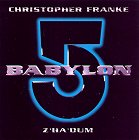 The smashing finale to Babylon 5’s third season received an atypically quiet musical score until the last couple of acts, and now that atypically quiet musical score can be yours! The two highlights of this album are the “Into The Abyss” track, almost nine minutes long, which follows the action non-stop from the Shadow ambush of Babylon 5 through Sheridan’s amazing leap of faith, and “Epilogue / What The Future May Hold”, part of which had been heard in a slightly different form on Shadow Dancing, but are much better represented here.
The smashing finale to Babylon 5’s third season received an atypically quiet musical score until the last couple of acts, and now that atypically quiet musical score can be yours! The two highlights of this album are the “Into The Abyss” track, almost nine minutes long, which follows the action non-stop from the Shadow ambush of Babylon 5 through Sheridan’s amazing leap of faith, and “Epilogue / What The Future May Hold”, part of which had been heard in a slightly different form on Shadow Dancing, but are much better represented here.
- Destiny Awaits / Delenn at the Gray Council / Main Title (4:58)
- G’Kar & Ivanova / In Medlab / Sheridan Questions Delenn (5:43)
- Anna Tells Her Story / Sheridan Gives In / Determined To Go (6:12)
- Towards Z’Ha’Dum / Arrival on Z’Ha’Dum / Meeting the Enemy (7:39)
Into The Abyss (8:48)
- Epilogue / What The Future May Hold / End Title (3:03)
Released by: Sonic Images
Release date: 1997
Total running time: 36:23
